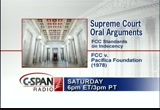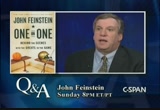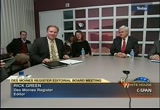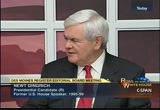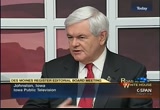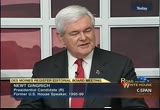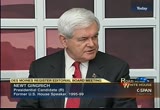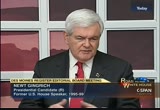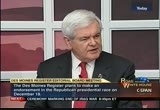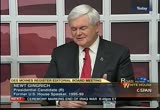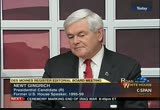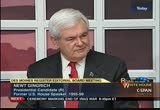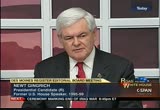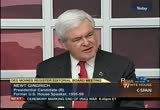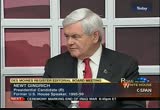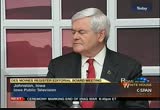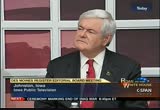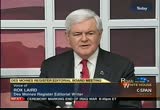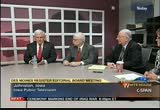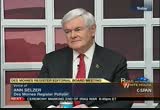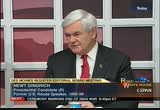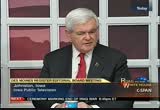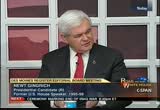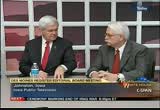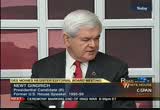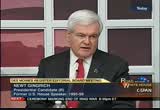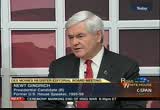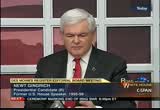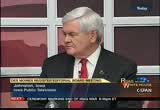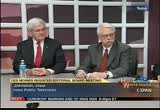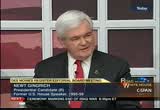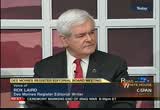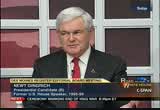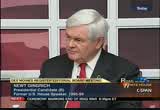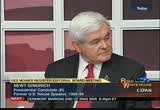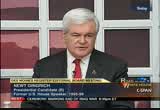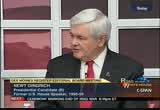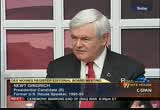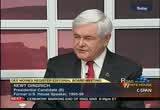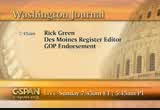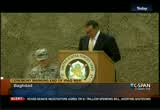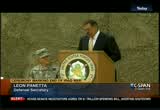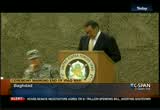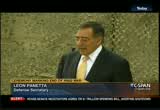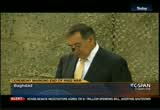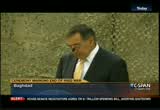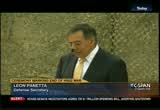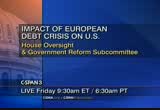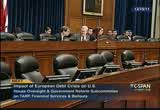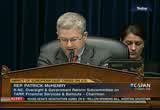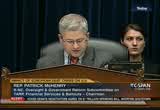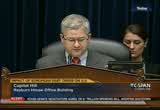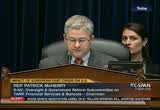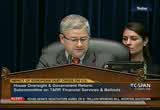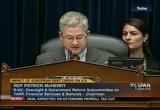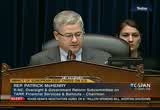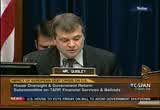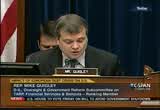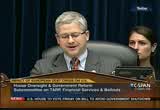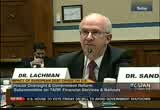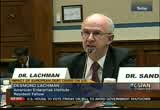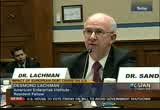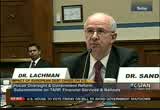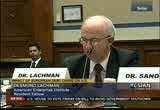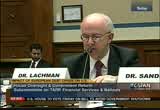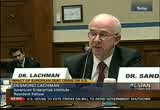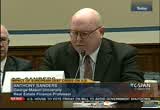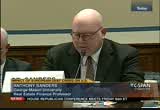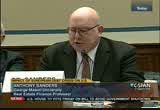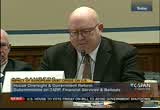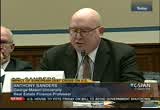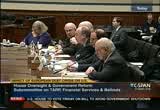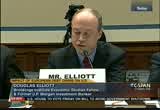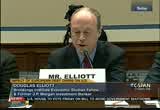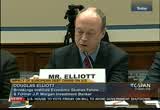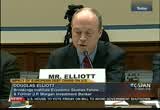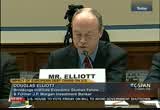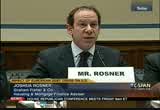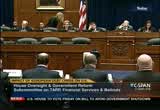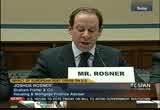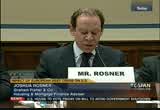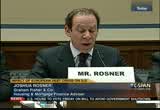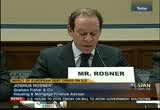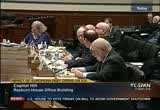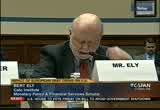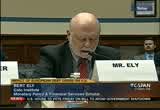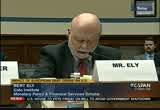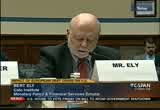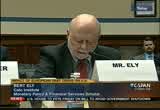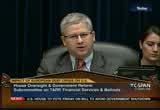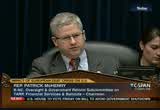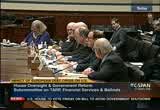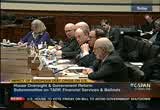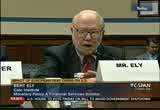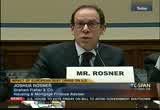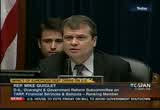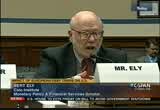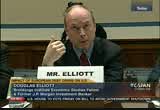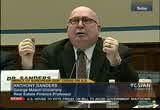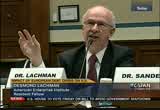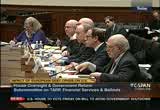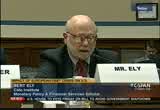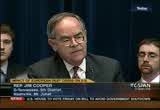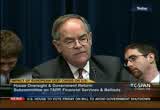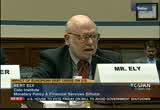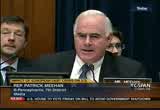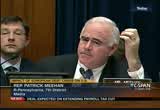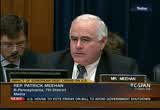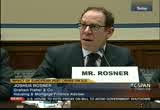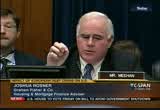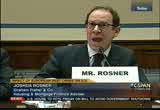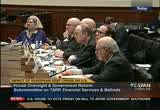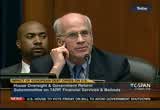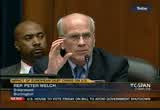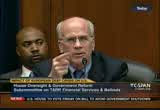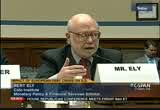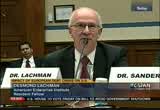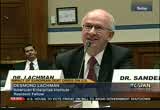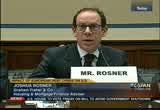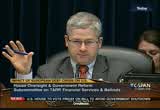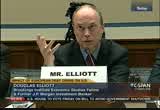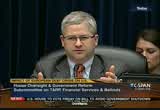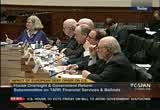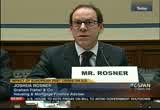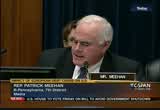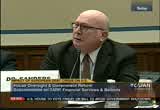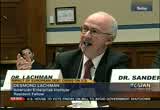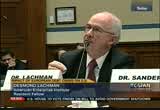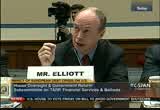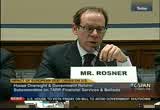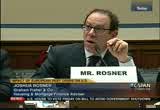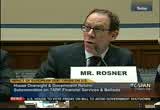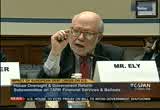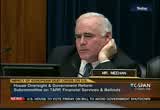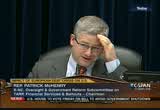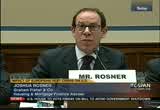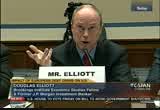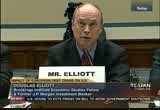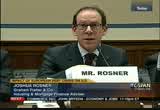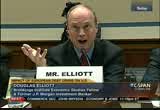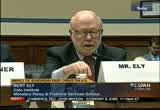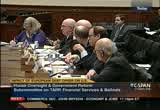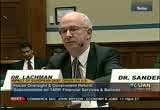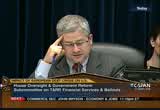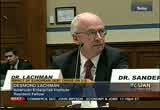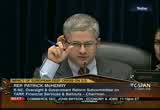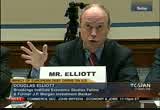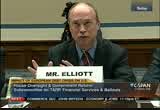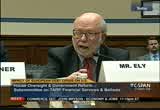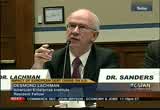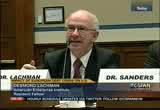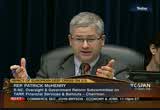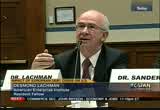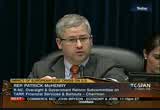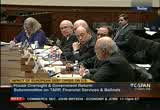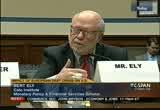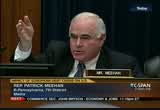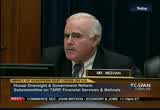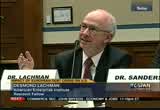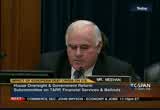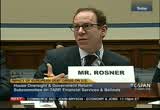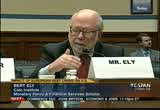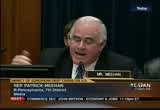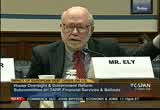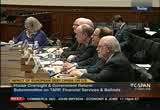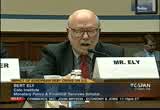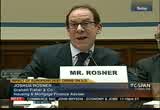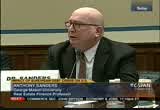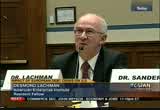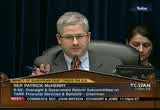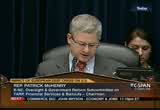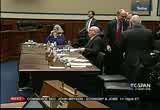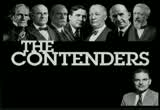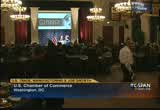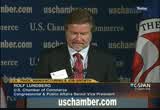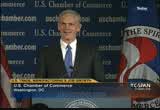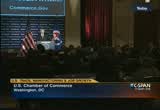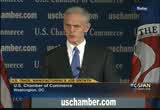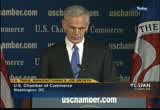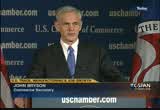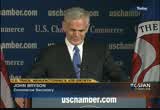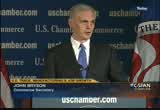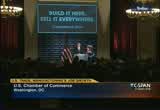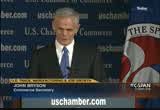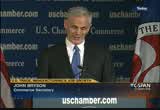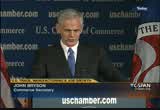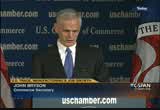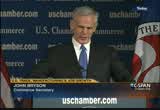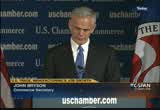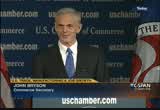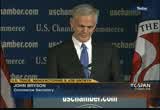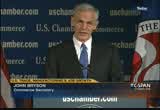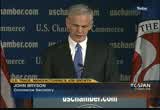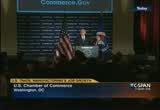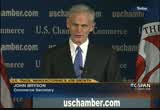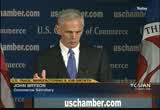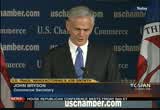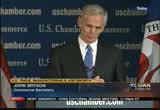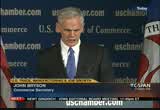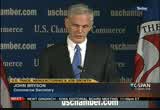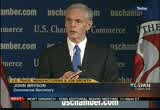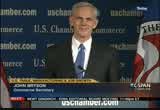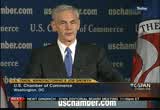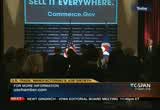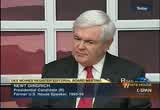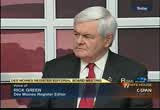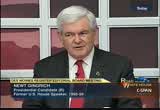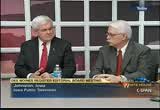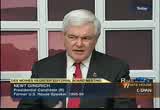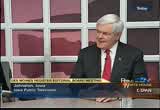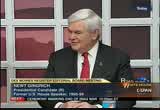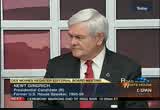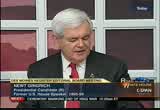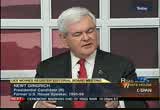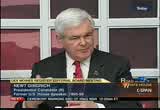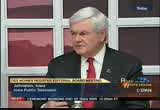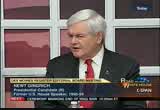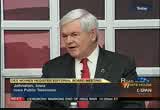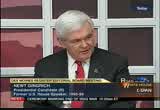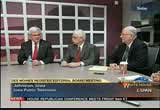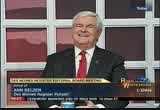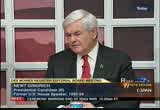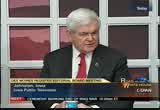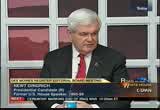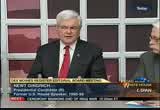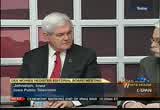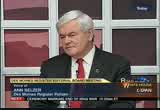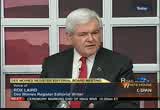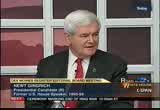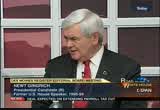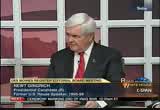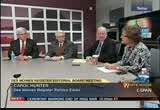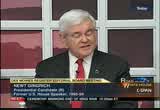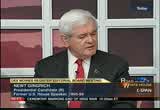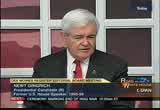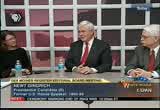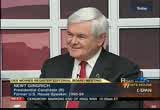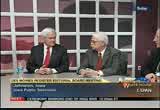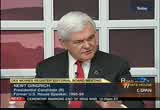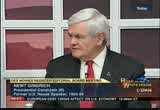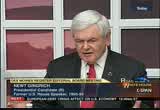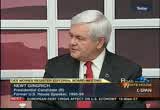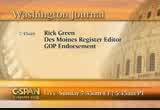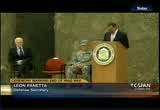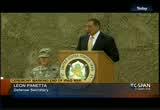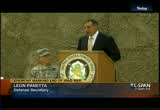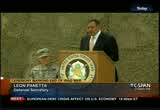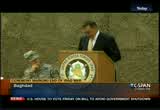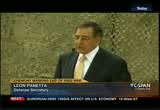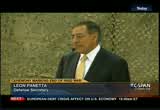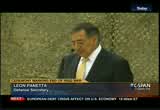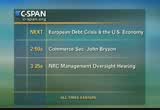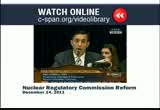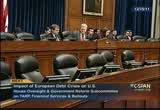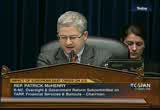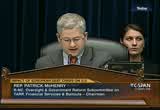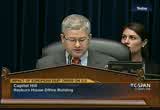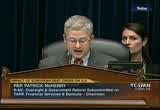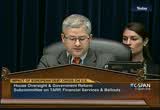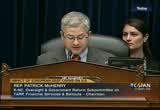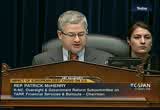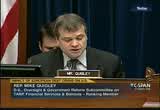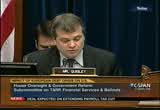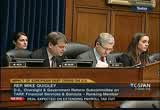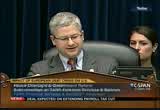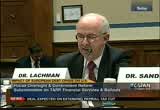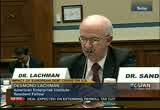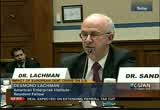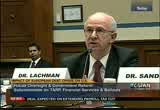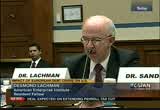tv Capitol Hill Hearings CSPAN December 15, 2011 8:00pm-1:00am EST
8:00 pm
child could have been turning the dial and would have come across those words. >> seized and radio will air that historic argument. listen >> in a few moments, gop presidential candidate newt gingrich in iowa meets with the des moines register editorial board. in about 40 minutes, the baghdad ceremony marking the end of the iraq war. after that, a hearing on how the european debt crisis may affect the u.s. economy. later, commerce secretary john bryson on the economy, business, and jobs. >> for the past few months on c- span, we have examined the political lives of the contenders, 14 men who fight for the court office of president, but lost, and had a lasting impact on american politics.
8:01 pm
we talk with a presidential historian richard norton smith, friday at 8:00 p.m. eastern. to review all the episodes, visit c-span.org/thecontenders. >> sometimes i think it would be best for government just to stay completely out of sports. a lot of the time when congress gets involved, the hearings are basically television shows designed to give the congress men and women involved exposure. >> john feinstein on the intersection of sports and government. >> sports is a multi, multi billion dollar business in this country. in terms of raising money for universities, for higher education, there are so many different ways that sports
8:02 pm
affects our lives. the stadiums that exist are built with government funds. often when i think the federal government should be more involved. >> his new book is "one-on-one." you can watch the rest of the interview sunday night on "q&a". >> republican presidential candidate newt gingrich met with the des moines register editorial board today for 40 minutes. this sunday, the newspaper will announce its endorsement for the january 3rd iowa caucuses. >> good morning, i am rick greene. i want to welcome you to the editorial board meeting. former house speaker newt gingrich, who is pursuing the
8:03 pm
republican nomination for the white house in 2012. it is good to have you here with us today. we have various editorial writers, political editors, just a chance to sit in a little bit. give us two or three minutes of an opening statement about where the campaign is so far. >> i am campaigning on the premise that we have very large challenges, that we need solutions the size of our challenge, that we had to have a national conversation and talk through how we are going to get this country back on the right track. what we need is a campaign that focuses on a choice among solutions and among potential problem solvers, to then focus on defeating president obama. i have consistently said i only have one opponent in this race, and that is president obama.
8:04 pm
my goal has been to talk about how to create jobs, how to balance the federal budget, how to reform washington and return power back home, and how to meet that economical and scientific challenges of the future. yesterday i was talking about brain science, an area that has enormous potential to save lives and save a great deal of pain, and to save an enormous amount of money and create a series of american export products that will be high-value jobs, part of an economic long-term growth pattern. i know that is different than traditional campaigns. i am determined to run a positive campaign. once you become the front runner, cost you hear what everyone has said. the next few weeks will be a challenge because i will stay
8:05 pm
focused on solutions and trying to communicate what we need to do as a country to be successful. >> that runs counter intuitive to the new gingrich we have known throughout your career. why are you taking that approach this time around? >> the country is an enormous trouble. this is the most important election since 1860. finding a way to bring the country together is really, really important. the deadlock we now have, not just in washington but in sacramento, for example, is really debilitating to the future of the country. >> you think your the person who can bring the country together, given your reputation for division of this in congress? >> my the business included worked with bill -- working with bill clinton to pass the first tax cut in 16 years. everything i got done by
8:06 pm
definition had to be bipartisan, including working with ronald reagan while tip o'neill was speaker. we had to get one-third of the democrats to vote with us. there is a huge difference between the public style, which was necessary to create the first republican majority in 40 years, and the ability to work across the aisle with democrats. i have been advocating for months that the house republicans passed the bill to develop oil and gas offshore. it is a great chance to be bipartisan. i was delighted in talking with paul ryan last night that he introduced a new bipartisan approach on medicare. it is a break in the eyes, a chance to start in a more bipartisan conversation.
8:07 pm
>> partisanship has hardened since she left office in a lot of ways. how do you think you can bridget? >> -- how do you think you can bridge kit. >> is the presidency too big? then they elected ronald reagan. it was too big for jimmy carter. if you have the most radical president in american history, and if you start intellectually with the idea that obama is a legitimate, trainer -- when you say he was a south side organizer, and he did not mean boys and girls clubs. he said he had never run anything. he sort of serve in the senate while running for president. he turned out to be a terrific candidate, but he did not know how to do any of this stuff.
8:08 pm
it takes a very high level of skill to be able to get our system to work. the founding fathers designed it that way. you might see bipartisanship if you have a president who in fact talked to the country. if i become the nominee, we will run and americans campaign, not a republican campaign. i have a friend who is a democrat who is switching his registration to vote for me. there are a lot of democrats and independents who worry about alzheimer's and parkinson's. while balancing the budget, we did double the national institutes of health budget. we showed a willingness to set priorities, to be frugal in one place and make an investment and others. i think that creates the potential for coalitions that are very different than people
8:09 pm
would traditionally think. >> i was watching the conversation with you a minute or two ago, and you said something that i was taken aback. you acknowledge that you perceive yourself as a change agent this election, not only a change agent but an outsider. how can you portray yourself as an outsider? >> look at the reaction of the establishment in both parties. they think i am an outsider. i am a person who has worked on issues for a very long time. i know the system very well. i have always approached the the system as somebody who wants to change it. somebody once said ronald reagan managed to serve as president for eight years and was never in washington. obviously that is not true, but
8:10 pm
we did a movie about it at the years ago and went out and film at the ranch. he spent one year out of eight at the ranch. talking to people there, you begin to understand why he did that. he never became a traditional washington insider. it is fair to say that if you look at all the patterns i have had and the way i have done things, i have consistently been in the country much more than i have been in washington, in terms of the psychology of how you measure things. when a strong america now began to develop here in iowa, i have been studying 6 sigma for most of my life and applying it to government. i had a congressional workshop. in washington turns -- the idea of brain science is a very outsider idea.
8:11 pm
i think of myself as a bridge between both the public and the future, and the insiders of the past. >> you have written about board washington. you have a washington flag on your lapel. >> this is a washington day for me. >> or you modeling yourself on a washington style of presidency? >> and nobody could model themselves as a washington style of presidency. >> now you create one of those public relations challenges. if i compare myself to anybody, they say i am grandiose. if i compare myself to no one, then you think gingrich does not have a clue. there are precedents to have been very successful at communicating clearly course
8:12 pm
sets of values around which the country organized themselves. they are all worth studying. it would study jefferson, jackson, lincoln, reagan, and look at how did they do it? there is a great book on reagan called "the education of ronald reagan." it helps you understand how reagan saw himself as an educator, rather than as a salesman. in march 2008, the 25th anniversary of the evil empire speech, when i read this book i suddenly saw his speeches differently. i took these two as an example and walk through what he was trying to accomplish and what he was trying to do. there is a great book on lincoln called "the eloquent
8:13 pm
president." what you see is people who thought of leadership as understanding where we have to go, communicating it clearly in no way that the american people said yes, i want you to do that, and then actually, methodically implement in that direction. let's talk about where we need to go, how we will do it, as well as the idea -- i talked to people at kaplan and elsewhere about teaching an online course from the white house. could you say to people, i want to outline for you the challenges we are faced with and i would like your input. it really first came to me on the idea that maybe are a schwarzenegger should teach an online course for the people of california on the california
8:14 pm
budget, so that people would understand. the technology is now available to dramatically expand public participation. passing bills nobody has seen is not a good idea. >> you are talking a lot about running against president obama. let's do a hypothetical. you are in the white house and you are president. a military spy grown has cashed -- crashed and then captured by the iranians. they are showcasing it around the country and talking about it. what is your reaction, and how does that contrast with what the president has currently done? >> they have had plenty of time when they could have destroyed the ground or the ground, or they could have sent in a team to pick it up. the second i knew it went down, i would have said, which of these two options are going to use? in the worst case, you just
8:15 pm
destroyed it on the ground. take whatever steps are necessary to make sure it got obliterated. >> what is your reaction to the way he handled it? >> this is the president -- washington had been commander- in-chief for eight years and he actually knew what the term commander-in-chief meant. the current president is a campaigner or explainer in chief. look at how he made the decision to drawdown in afghanistan. purely political. he met with an iraqi delegation this week which included a commander in the iranian revolutionary guard. this is a person we believe has been actively engaged in killing americans. this is a president who is simply not a serious person when it comes to national security.
8:16 pm
>> is it that he is not serious or he is inexperienced? >> i don't think he underside -- understands the downside consequence. things can go really, really bad. that is a very big problem. >> so if i am overseas, what can i expect from the gingrich administration with you as commander-in-chief? how'd you position the united states as a foreign power? >> he looked at both the dark roosevelt ago called softly but carry a big stick." -- it looked at the door roosevelts -- theodore roosevelt. you always have to ask the question, and then what? we have lots of power, we can use it, and then what? very often you get into these things where it is easy to get in and hard to get out. >> could you argue that the
8:17 pm
president is trying to be very cautious about military force and how he is handling the situation? >> you could argue that. in the case of a very sophisticated drone, i suspect there were plans to destroy it. you would not have a vehicle like that hanging out over iran without some kind of contingency plan for losing it. you have the same challenge with a helicopter that went down. there was pretty good evidence that the pakistanis gave it to the chinese. if you let your competitor get the 20-30 years of technology in one event, you are reducing the margin of your security. >> it would have done more than ask for it back, is that what you are saying? you are saying you would have sent american forces in to a sovereign country on a military
8:18 pm
mission? >> you had an american spy plane over a sovereign country, because presumably you thought it was a dangerous sovereign country. when it first went down, the easiest thing would have been to destroy it. i am not privy to secret information. >> but you think they should have had time -- >> they should have had a contingency plan to take it out. >> i presume that we have these things lying all over the middle east. would you be prepared to have teams go in any time one of those down? >> if you'd think a country is dangerous enough that you have to have a spy plane over it, then that is a country you are obviously prepared to take some risk with. again, it depends on the circumstances. in the case of that particular vehicle, i think it went down in a fairly remote area. >> you think, you don't know for
8:19 pm
sure. >> no, i am not sure. >> how can you criticize that they did not do it? >> because very knowledgeable people who have criticized it. specialists have said letting that thing falling into their hands without destroying it is a significant mistake. that is not my view, that is people who have studied this. >> are there things you think the president has done well? does anything come to mind? >> i am supportive of his effort to get more charter schools and to give parents more choice in systems that are unionized and where poor children are trapped in bad schools. >> i read a biography of you late last year or early this year. one of the chapters was dealing with this, how do you communicate core values clearly to the american public?
8:20 pm
i thought these are the underpinnings of the tea party movement. i wonder if you accept our role as being a father of the tea party movement, and how you see it as it has played out. >> someone said to me that the democrats ran an ad recently that went back to 1995 and made me the father of the tea party movement. there is a book called a " taxpayer's tea party" which was written by a constituent of mine who is now state representative. it was written at my suggestion. i accident -- i actually participated at a tea party in boston that year as part of the contract with america campaign. to some extent, yes, i think i probably had something to do with the resurrection of the tea party as a model. many of the folks who staff our
8:21 pm
campaigns -- we just had two votes in south carolina, in myrtle beach the tea party voted 75% to endorse me. another tea party group voted 80% to endorse me. we have a heavily tea party infused campaign. i like most of what they are doing. they are studying the constitution, the declaration of independence, they are reading the federalist papers. they have broughams to get together to talk about the base of the american system. they want more respect for the constitution, not less. on balance, they have been a positive force. >> can you define it briefly what you mean by american exceptionalism? >> it is the declaration of independence assertion that we hold these truths to be self-
8:22 pm
evident, that all men are created equal, and that we are endowed by our creator with certain unalienable rights, among them the pursuit of -- life, liberty, and the pursuit of happiness. the individual american is sovereign. the new hampshire state slogan is "live free or die." i think that what -- that is what makes us remarkably different from europe. in america, you are always a citizen. in america, the government should always be serving you. in most parts of the world, the government expects you to serve the government. it is the american system that
8:23 pm
is exceptional, not necessarily america. it would be wonderful if other countries had is deep respect for rights for the individual as we do. >> did you see comparisons between the civil rights era and the push these days for gay rights? there were lots of people in the south in the 1960's who would never have consented to blacks and whites marrying. that has become a lot of the land. there are lots of gay folks who see themselves in the same predicament. talk about that. >> and there is an enormous difference between an inescapable fact of race, and
8:24 pm
you have to decide whether in fact you were going to tolerate discrimination based on race, and the question about what are your values? i think marriage is between a man and woman. that is a value proposition. it is very important for society to try to emphasize that relationship. people growing up in a structure in which children have parents they look up to and relate to is a very important thing. i think there is a big difference between saying that you are going to have an acceptance of people's lifestyle and saying you are going to normalize that as the standard for the whole country. the fact is, i am a traditional, classic conservative. i am defending the value system with a several thousand year history behind it, which is pretty clear that almost nobody who studies that thou system has
8:25 pm
any doubts about the clarity. >> a lot of people in the south in the 1950's and 1960's he said mixed marriage was a cultural thing that they could not accept at the time. >> you can always make parallels if you want to. i do not accept that parallel. i think it is fairly ludicrous. nobody is suggesting we have legal segregation of gays. no one is suggesting you not be allowed to use the bathroom or have separate water fountains. segregation was a horrible thing. i grew up in an integrated u.s. army. i arrived at fort benning when i was a junior in high school. segregation was still legal. it is a totally different thing. i think it is frankly offensive to have this whole effort to draw the contrast and say if you feel strongly about marriage being between a man and woman, does that parallel integration? no. i am defending a tradition that
8:26 pm
is very deep in our caller -- in our culture. >> as president, you could turn that tide if that is what your value is. >> to shift to the benefit patterns economically so there's a greater benefit to being married. if you look at the impact -- if you look at the original warnings on this topic for years ago, but every criteria, the breakdown of families has gotten worse. the number of children growing up without any kind of adult supervision has gotten worse. yet moynihan was roundly attacked for having set things that are now patently true and clearly obvious. santorum is on to something obvious here. finding a way to create a positive environment to maximize the desirability of marriage being the central building block of society is a very important step we ought to take.
8:27 pm
>> apart from a marriage, you are saying supporting equal treatment of gay marriage? >> i am against discrimination against people based on their private behavior. >> so what is your position on the "don't ask, don't tell" policy? >> that would be my policy, "don't ask, don't tell." i don't think in the military you want sexual behavior to be an overt issue. >> you would not want that repealed? >> i would not want that repealed. >> would you try to have it reinstated? >> [unintelligible] when the president moved in the opposite direction, the two major ground combat forces were both deeply opposed. >> they are not now, though. >> they are not now because they respond to the commander-in- chief.
8:28 pm
i think clearly often when you are in the chain of command, there is a way to ask the question just right. the truth is, i think it would be a career ending conversation. >> do you believe that people choose to be gay? >> i believe it is a combination of genetics and environment. i think that both are involved. part of the question is, do you want a society that has a bias in one direction or not? >> so people can choose one way or the other? >> people have a significant range of choice within a genetic pattern. i don't believe in genetic determinism. there are propensities. are you more likely to do this or to do that? that does not mean the definition.
8:29 pm
>> people choose to be celibate. people choose many things in life. there is a bias in favor of non celibacy. yet there are a substantial number of people that use celibacy of religious vocation or for other reasons. people have many choices within a genetic pattern. it is not a predetermined either/or. >> let's go back to something cathy mentioned earlier about the most recent i will hold. -- the most recent iowa poll. talking about the likelihood for scandal in the white house. herman cain topped that poll and you were second. >> i have been very open with the fact that i have done things in my life that i am not proud of and things i have had to ask god's forgiveness for, and i
8:30 pm
have had to seek reconciliation. if you measured the only on the past, you might decide not to vote for me. if you measure me on who i am now as a grandfather and someone who at 68 has learned a lot, you might decide to vote for me. i have been very willing to have people ask questions and try to deal with it. that is part of what i bring into the race. every candidate brings pluses and minuses. people have to decide, can he balance the budget, actually get things done in washington? when everybody thought it would be gone into line, you can always -- people have to render judgment, and they will. >> the house ethics charges where you were reprimanded and paid a $300,000 fine, most of those were in essence overturned
8:31 pm
by later irs rulings and court rulings. what stuck was that you have provided false information to the committee. how did that come to pass? >> i am glad you said what you just did. it is one of the most frustrating things of my career. we were ultimately told we were right, it just took two years. the irs said we were right on one set of questions. it is truly one of the most frustrating things of my career. the one thing that happened that was wrong is there was a single letter written by a junior attorney in a very prestigious law firm, and of very expensive lawyer i had hired had delegated it to an assistant, who delegated to a brand new assistant. there is no question, i should not have signed it. at the time i was speaker and we were doing dozens of things.
8:32 pm
i stand it, and it did not leap out at me. it had been done by a prestigious law firm, and i signed it. i paid the cost of the investigation. now that you know that nancy pelosi was on the ethics committee at that time, you can appreciate how partisan the process was. >> do you regret paying the fine, because that is out there on the record now. >> democrats have made clear that they either get a pound of flesh or this issue would go on for the entire term. we had not passed the balanced budget. the question was, there was the public embarrassment, but the things i was charged with, everyone was subsequently overturned. >> and what the committee, which was bipartisan, and the house, voted in a large bipartisan
8:33 pm
vote " to sanction you. >> it was ending a problem and i asked the republican members to vote yes. i said to them, we have got to get this behind us. you could not get to the substance of balancing the budget and cutting taxes -- there were a lot of republicans who were very angry about the way this came down. in retrospect, when you realize that the charges were all false. back some of them today are saying otherwise. >> i fully expect a number of republicans who had a very aggressive leader, who was determined to reform welfare, determined to cut taxes and balance the federal budget, they might not have gotten their earmarks, or they might not agree on how to get bill clinton to sign a bill. it is very complex balancing
8:34 pm
act to be the most conservative speaker of modern times and get bill clinton's signature. i would say to you that i am fairly comfortable in an institution that currently has 9% approval, to have some of them disapproving. it just further proof that i am an outsider. >> if i was going to go to a caucus on january 3rd and consider voting for you, one of the things that really troubles me is that respect to senator coburn, senator kellen had made no secret of the fact that they don't support you. in fact, they oppose you. they have caught too arrogant and erratic. based on their experience -- how you answer that? -- have called you arrogant and erratic. >> i normally don't answer it.
8:35 pm
senator program is allowed to have his opinion. he wants to kill ethanol. i would just suggest that if you are aggressive enough to create the first majority in 40 years and in that process if you or aggressive enough to reform welfare -- the only major entitlement reform of your lifetime. i did it. that is a balancing act. then if you are willing to actually write balanced budgets that bill clinton will sign, of course, hard-line conservatives are going to say that is an employer budget. they are exactly right -- that impure budget.
8:36 pm
reagan had a firm rule, if you can get 8%, to take the deal. >> their criticism was based on your leadership style. >> my leadership style was to go down to the white house and say, i have to have this, what do you have to have? i come back and say, here is the deal. it is a leadership style. that is what they didn't like. there is an old rule in congress, go along to get along. that is part of why i left congress. when i was no longer capable of leading, it was time to go out and do something interesting, which i have done for 12 years. i have had a great life. if you had pet projects that were your specialty, then i made you very uncomfortable, because i wanted the most effective,
8:37 pm
conservative government we could get. >> you talk about balancing the budget four times. does that include the tax increases? >> no, the tax increase was under clinton before i got to be speaker, and i voted against it. we balance the budget while cutting taxes, but we brought employment down to 4.2%. >> can we balance the budget now without tax increases or revenue increases? >> revenue increase is on the floor. you have offshore drilling of gas and oil, you can dramatically increase federal revenues. north dakota has 3% unemployment. the guy who is the leading developer of north dakota gas and oil said it you -- you would get a trillion dollars in royalties for the next generation. i gave a speech yesterday on how brain science could potentially
8:38 pm
saved a trillion dollars in alzheimer's alone. that is real money. i am for more revenue by having people go to work, but opening of federal lands. we own 69% of alaska. that is 1.5 times the size of texas. you could give half of texas to the environmentalist and that would lead to an area the size of texas to develop. there are lots of things we could do to generate more federal revenue. they do not require raising taxes. >> a just have a couple of quick questions. let's dismiss what is being said about you from the insiders and those on the other side of the aisle. we know based on all of our polling that there is still an incredible number of undecided
8:39 pm
iowans. we have met with them everywhere from starbucks to coming into our office. here is something that crystallizes the question for you. i am aware that you help balance the budget. i also know you shut down the government. he reached across the aisle but it also sat down with nancy pelosi and talked about environmental standards. he is one who is quick to speak before he thinks. which newt gingrich are we getting? that is what a lot of caucus goers are asking, and can we trust him? >> that is a very good question. people should resolve that before they make a decision. all i can tell them is that i have spent 53 years trying to understand what america has to do to survive, how to explain this to the american people to give you permission to do it,
8:40 pm
and how to implement it if they give you permission. am i more complex than most candidates? yes. am i more interested in ideas than most candidates? yes. am i more willing to reach out and try to find ways to work with democrats? yes. if you think somebody without ideas, without experience, and without willingness to be bipartisan can fix america, go vote for them. i don't think it will work. i think it will be a disaster. but if you think in this particular moment, given these particular problems, that having a 68-year-old grandfather who actually knows what he is doing and has actually studied government has whole life, and has a proven record, campaigned for reagan in the late 1970's --
8:41 pm
when people say i am not conservative, you almost have to wonder what planet they have been on. are there challenges with a gingrich presidency? of course. i say this openly. i will make mistakes. yet when you have change on this scale without mistakes, if you want to get america back on the right track, what i promise is, we will be open to people telling us that is a mistake. we will be open to a collective ability to move forward in a way no other candidate could possibly do. people have to decide. i am content -- as an army brat who watched his father served 27 years in the infantry, i am content with the fact that this system allows a guy like me to
8:42 pm
say what i honestly believe. i am very comfortable with whatever judgment people are under. >> thank you for participating with us today and best of luck during the rest of the campaign. >> thank you. thank you all very much. [captioning performed by national captioning institute] [captions copyright national cable satellite corp. 2011] >> the des moines register will announce its endorsement for the presidential nomination this sunday. on sundays "washington journal, we will be joined by rick green , the des moines register
8:43 pm
editor. the iowa caucuses are tuesday, january 3. >> hear what the candidates are saying from the campaign trail at the newly designed c-span website for campaign 2012. >> i say it cannot live with a nuclear iran, then you have to say what to do. i think all options are on the table. >> if we took that oath of office seriously in washington, we would get rid of 80% of the government. >> in question was, who is the proven constitutional conservative in this race, and that would be meet. >> -- that would be me. >> defense secretary leon panetta spoke in baghdad today at a ceremony marking the end of the iraq war. corn 500 americans were killed in the nine-year war, and 32,000 wounded. here is a portion of the
8:44 pm
ceremony. [applause] >> thank you very much. honored guests, it is a profound honor being here in america. to have the opportunity to persist -- to participate in this moving ceremony on this very historic occasion, for both the iraqi people and the american people. in their words, no ceremony can provide full tribute to the sacrifices that have brought
8:45 pm
this day to pass. i am reminded of what president lincoln set at gettysburg about a different war at a different time, as he paid tribute to the fallen in that war. his words echoed through the years, as we pay tribute to the fallen of this war. the world will little note nor long remember what we say here, but it can never forget what they did here. today, we are honored by the presence of so many distinguished guests of the
8:46 pm
iraqi and american governments. and to the distinguished members of the iraqi government and the iraqi military, thank you for your courage, for your leadership, for your friendship , over these many number of years. more importantly, thank you for your loyalty to the future of iraq. your dream of an independent and sovereign iraq is now and reality thuringia is now a reality. we are deeply fortunate that in addition to all the great commanders who let our troops here, there are two great americans who stepped forward to lead this mission through this final transition.
8:47 pm
today we honor these two national treasures, ambassador jeffrey and general lawson. jeff, i want to thank you for your wise counsel, for your brilliant diplomacy, at a time that called for both. our nation owes you its highest gratitude for your tireless commitment to this mission through multiple, link the deployments. i want to offer my deepest thanks on behalf of the american people for shouldering the burden of leadership. your effort to make this day reality is nothing short of miraculous. this is one of the most complex
8:48 pm
logistical undertaking in u.s. military history. 50,000 u.s. troops withdrawn seamlessly, dozens of bases closed, millions of pieces of equipment that had to be transferred call all all maintaining the security of our forces and the security of the iraqi people. you will now reunite at the pentagon with someone else who is able leadership under critical times in this war effort helped achieve its ultimate success. u.s. army chief of staff re odierno. together with ray, you will now leave the army to an important moment of transition.
8:49 pm
you are part of a generation of battle proven leaders who have now taken the reins of our national security. i cannot tell you how much we benefit from that great experience. lloyd, i know you will ensure that ray odierno and mark demsky and others who fought in this conflict, that as we confront the strategic challenges of the future, we will never forget the lessons of war. nor will we ever forget the sacrifices of the more than 1 million men and women of the united states armed forces who served in iraq and the sacrifices of their families through deployment after
8:50 pm
deployment after deployment. families somehow withstood the strain, the sacrifice, and the heartbreak of watching their loved ones got off to war -- go off to war. their loved ones fought in places like fallujah, sadr city, and elsewhere. today in particular, we remember that nearly 4500 brave americans made the ultimate sacrifice for their country, as well as the more than 30,000 wounded warriors, many of whom still struggle with serious, life altering injuries. to all of the men and women in uniform today, your nation is
8:51 pm
deeply indebted to you. you have done everything urination ask you to do, and more. your dedication, your commitment to this -- you have done everything your nation asked you to do, and more. leon the most remarkable progress we have seen here in baghdad and across this country. you came to this land between the rivers, again and again and again. it did not know whether you would return to your loved ones. you will leave with great pride, lasting pride, secure in knowing that your sacrifice has helped the iraqi people begin a new chapter in history, free
8:52 pm
from tyranny and false hope for prosperity and peace, particularly for this country's future generations. this outcome was never certain, especially during of the war's darkest days. 2006, as a member of president bush's study group, i've traveled here at a time when sectarian violence was skyrocketing and it seemed as if nothing was working. iraq was struggling with turmoil, with violence, with uncertainty. today, some five years later, after a great deal of blood has been spilled by both iraqis and americans, the mission of iraq
8:53 pm
that could finally governor and secure itself has become real. the iraqi army and police have been rebuilt. they are capable of responding to threats. violence levels are down. al qaeda has been weakened. the rule of law has been strengthened. educational opportunities have been expanded, and economic growth is expanding as well. this progress has been sustained, even as we have withdrawn nearly 150,000 u.s. combat forces from this country. the departure of the remaining u.s. forces within these last few days to the end of the year, we salute the fact that iraq is now fully responsible for
8:54 pm
directing its own path to future security and future prosperity. to be sure, the cost was high. the blood and treasure of the united states and also for the iraqi people, but those lives have not been lost in vain. they gave birth to an independent, free, and a sovereign iraq. because of the sacrifices made, these years of war have now yielded to a new era of opportunity. together with the iraqi people, the united states welcomes the next stage in u.s.-iraqi relations, one that will be rooted in mutual interest and mutual respect.
8:55 pm
let me be clear. iraq will be tested in the days ahead by terrorism, by those who would seek to divide, and by economic and social issues, by the demands of democracy itself. challenges remain, but the united states will be there to stand by the iraqi people as they navigate those challenges to build a stronger and more prosperous nation. to that end, the u.s. is deepening our relationship with iraq through our office of security cooperation, and iraq security forces will continue to partner with u.s. central command. the u.s. will maintain a
8:56 pm
significant diplomatic presence here in iraq. we will continue to help iraq address a violent extremism and defend against an external threats, and we undertake this transition today reminding iraq that it has in the united states and committed friend and a committed partner. we owe it to all the lives that have been sacrificed in this war not to fail. i believe that the fundamental the dream of all humanity is to be able to give our children a better life. today, the iraqi people move closer to realizing that dream. iraqis can take pride in knowing
8:57 pm
that for the service and sacrifice of so many brave warriors, your children will have a better future. that is the reward that we all cherish on this historic day. this is not the end. this is truly the beginning. may god bless our troops, and god bless america, and may god bless iraq, its people, and its future. thank you. [applause] >> ladies and gentlemen, please rise for the benediction and the retiring of the colors.
8:58 pm
♪ >> a portion of the baghdad ceremony marking the end of the u.s. mission there. a residual force of four thousand u.s. troops will remain in kuwait for the start of the new year. in a few moments, a hearing on how the european debt crisis may affect the u.s. economy. in a little more than two hours, commerce secretary john bryson on the economy, business, and jobs. after that, the des moines registers editorial meetings with gop presidential candidate newt gingrich. later we will rea error of the baghdad ceremony marking the end of the iraq war.
8:59 pm
we'll examine the impact of the european debt crisis on the u.s.. witnesses include representatives of the federal reserve and the international monetary fund. that is on c-span3, live at 9:30 eastern. >> this weekend on both t d, -- on book tv, saturday at 7:00 p.m. and sunday at 11 eastern. also, walter isaacson on his best-selling biography of steve jobs. that is saturday night at 8:00 and sunday at 10:00. cheap travel on the internet makes it easy for immigrants to stay in touch with their home countries. saturday evening at 10 eastern and sunday at 9 eastern and pacific. watch book tv every weekend on
9:00 pm
c-span2. >> there is much more to the newly designed c-span.org, making it easy for you to watch today's events. more features, so you can quickly scroll through all the programs on the c-span networks and even receive an e-mail alert when your program is scheduled to air. more access to our most popular series and programs. you can see where they are available on cable or satellite systems across the country. books, log onnd at the new c-span.org.
9:01 pm
>> economist told congress thursday that the european debt crisis will likely hurt the u.s. economy. the house subcommittee hearing comes a week after countries discussed austerity. >> are hearing today is what the euro crisis means for taxpayers in u.s. economy. this is the first of two hearings. we have an additional one tomorrow at 9:30 a.m. in room. a representative from our central bank right downtown and one from treasury as well. tradition of this committee to read this. we exist to secure to fundamental principles. americans have a right to note
9:02 pm
that the money washington takes from them is well spent. americans deserve a government that works for them. our duty is to protect these rights. taxpayers have a right to know what they get from their government. we will work tirelessly and partner with what dogs to deliver facts and bring general reform. this is the mission of the government reform committee. i recognize myself now for five minutes for an opening statement. americans witnessed domestic and global markets deteriorate resulting in job losses and unprecedented measures to prop up financial institutions. as the economy remains vulnerable, the european union fights to fend off a second wave of turmoil. today's hearing examines
9:03 pm
economic unrest facing europe and international organizations. what first. as a great crisis spread throughout the eu. now dictates global headlines and the way european nations are categorized. the crisis began to take out head of european states and even managed to build the closest of relationships between president sarkozy of france and angela merkel of germany. the eu instituted the european financial facility. they're looking to address the solvency issue and the crisis
9:04 pm
facing european nations. it seems their actions have failed the desire. the great crisis transformed into a full-fledged e eurozone crisis, intensifying the contagion to the larger economy. today as leaders worked to strengthen the framework of the eu, they have become more dependent to use their balance sheet to rescue the global a economy. the central banks are not shying away from this. in effort to a european banks that had trouble accessing dollars, six banks led by the federal reserve board dollars to easier sovereign debt crisis. well welcomed by the markets, some have warned that the
9:05 pm
federal reserve is allowing the european central bank to create claims against the fed. it is important to recognize what the federal reserve determined as prevent exposure to the european central bank. it is prudent for the fed to review whether this president is using the incentives to sell underperforming assets during the intervening calm. would they have acted sooner if they could not rely on capital injection from the fed? another item is the role of the eurozone leaders in determining the conditions of credit default swaps and greek bonds. after they declared that holders would take voluntary pay
9:06 pm
cut, they were unable to serve the purpose. the sanctity of a contract is questions. such uncertainty may have long- term consequences as participants must factor in such risks to a greater degree. if we've learned anything from the last crisis, it is that impromptu presence by governments increases uncertainty and the likelihood of capital injections on behalf of taxpayers. in addition to market uncertainty, there reality -- the reality is reducing lending due to under capitalization. the implications of the european economy are significant. a second recession would reduce
9:07 pm
exports and visibly influence the value of the u.s. dollar. the severity of these effects on the u.s. economy is anyone's guess. the only certainty is europe's crisis is not a global crisis. they are reinforcing the interconnectedness of the global economy, a they conduct a vigorous oversight on rescue proposals and threats to our economy and american jobs, a threat to the american people way of life, and the value of the currency they hold. simple question still need to be answered. are the actions consistent with the mandate? are the firms that are seeking liquidity illiquid or insolvent?
9:08 pm
i am interested to hear from our expert witnesses today about their views. i appreciate the panel. i now recognize the ranking member. >> thank you. trillions of years and that remain outstanding. this has imperiled the capacity of the governments to repay the debt thereby receiving a default. default by a major economy would have devastating consequences for the american taxpayer. we have over $1 trillion of dollars invested. we are exposed to nearly five trillion in potential losses.
9:09 pm
if they were to become insolvent, the ripple effect would be catastrophic. if europe sinks into a prolonged recession, and the small businesses will move out on valuable customers. retirement plans are invested in european assets. our economy would grow more slowly or slide into a recession. standards of living would decline. there are no questions at a healthy european economy is vital to the natural interest of the united states. we must protect the american taxpayer. i look forward to hearing testimony from our witnesses on what they see as the proper role of the u.s. government. europe must reform itself. countries like chilly and others need to address their short- term challenges.
9:10 pm
if this sounds like the pot calling the kettle black comedy would be right. the u.s. has failed to do a debt retention plan. europe's challenge is also political. what europe has the economic resources, it has failed to do so repeatedly. european leaders will have to surmount their political differences and agree that it'll require a shared sacrifice. it to be the tragedy of the spirit of cooperation founded on this crisis. it will be equally tragic if they were and able to come to an agreement. the government matters. they had made it harder to fulfill that mission. i joined my colleague in urging
9:11 pm
leaders to take the necessary steps to resolve the crisis and help restore the global economy to sustainable growth. the ranking you o member. we will now recognize the panel before us today. dr. desmond lachman, anthony sanders, mr. douglas j. elliot, dr. joshua rosner, mr. bert ely. i know at least four of you had testified before.
9:12 pm
it is standard practice that all witnesses be sworn. if you will please rise. do you solemnly swear that the testimony you give will be the truth, the whole truth, and nothing but the truth? you may be seated. let the record reflect that all the witnesses answered in affirmative. seen as you have testified before, if you will see the ones before you. this means what it means when you are at a stoplight. green means go. we will recognize mr. lachman for 5 minutes. >> thank you.
9:13 pm
forgive me to testify you. in my oral statement, i like to set up the reasons that there of the basic of again participation in the months ahead. it could resolve within the next 12 months. it really does have a sense of urgency. i do not like to care of the risks that they pose. the economic recovery should be an intensification of the crisis and lost to consider the various measures. they have been undertaken by the imf and fed reserve to diffuse the crisis. over the past few months, there
9:14 pm
has been a marked participation of europe. it suggests we can get this as early as 2012. this appears to be losing deposits. it is only a matter of time before they will get the hard defaults. this is not affecting year of -- italy and spain as too big to bail. should these problems intensify, the question would be there. the european debt crisis has a material impact on the european banking system which is in the throes of a credit crunch that is likely to intensify. we are seeing the german economy
9:15 pm
is showing signs of moving in recession. european policy makers in imf are hoping that country's in european periphery can correct their large public finance and external imbalances in several years of the fiscal austerity within the framework of a fixed exchange-rate system that does not allow them to devalue its. i very much doubt where this can work. they are likely to throw them into the deepest of recessions that will make the collection of taxes difficult. until have a political backlash. the european crisis could derail the united states recovery. we have already mentioned the idea that it could diminish u.s.
9:16 pm
export prospects and results in weakening of the euro. it to make it difficult for the third markets. the most important channel for which the european crisis could affect it would be duty -- would be through the united states. they got close to a trillion dollars deposited with european banks. united states banks are very exposed to germany and france. let me touch on the imf and the federal reserve. commitments to greece, ireland, and portugal are route $100 billion. -- are around $100 billion. this fits u.s. taxpayers at risk for the tune of $20 billion. it is of note that the imf has never lent money on this scale to any country in relation to
9:17 pm
the size of the countries as it does to greece, ireland, and portugal. the commitment to this is as much as 10% of their gdp. the recent european summit has european countries proposing to make bilateral loans to the tune of $260 billion that would be intended to loan to italy and spain. it is important to recognize that if those bilateral loans give them a claim on the imf as opposed to a claim on italy and spain, in the u.s. taxpayer would be put at risk for those loans. if italy and spain to have to go to the imf for large loans, the country's could be enormous.
9:18 pm
considering the combined commitment to italy and spain could well exceed the trillion dollars, we're talking about u.s. taxpayers they address for up to $200 billion. in assisting the potential risk , one has to consider that the risk of the on wrapping of the euro is a distinct possibility. were it to occur at in disorderly manner, it would have a devastating impact on the outlook. imf loans to the periphery could reach levels that should be on presidentially -- unprecedented. lastly, and judging by the 2008 and nine experience with currency swaps, the dollar swap lines could reach $600 billion in the event the crisis were to intensify.
9:19 pm
what must pose that the risk would be circumscribed by the fact that the main counterplot to those -- counterpart would be swapped. they could print the year rose to buy the dollars to repay those loans. thank you. >> thank you. >> members of the subcommittee, thank you for inviting me to testify. the eurozone is teetering on collapse. because of the problem is excessive government spending and leading to excessive government debt coupled with slowed gdp growth. the largest european countries are expected to have gdp growth at 1.3% for 2012. the imf has also produced a long-term real gdp forecast in which they have discovered most
9:20 pm
of the european zone will have less than 2% gdp growth by 2016. if we take a book at the household and financial debts in europe, we find that the u.k.'s debt to gdp ratio including household and finances is over 900%. japan is over 600%. the u.s. is over 300%. they are drowning in debt. a recent article from economist at the european central bank says that there is a stick of again-up that of the size of government on growth. the european union will unify a break up or downsize regardless without spending too much money and taking on too much debt to reduce the ability to pay for it
9:21 pm
was slow gdp growth. additional debt is not the answer. it is the problem. the other solution is austerity. making loans to the central bank does not solve the underlying structural problem. it only makes the debt to gdp problem worse. it is a short-term solution for worsening gdp growth. if germany and france are successful in creating a fiscally integrated europe, there will be less of a rush to purchase u.s. treasurys. given that the fed is already the purchaser of u.s. treasuries, this could be a problem. u.k. and japan continue to increase their purchases. the u.k. and japan are not enough to pick up the slack of china purchases. the fed has been active in european bailout starting in
9:22 pm
2007. it pete in 2008. the largest european borrower was the failed one. we are still in the dark on the guarantees. the ecb drew $552 million from the fed. in november, there's an interest rate of 1.08%. the fed also bar the same amount in prior week. how long will they keep the swap line opened? well the cannot see it in real time, the evidence indicates a basic swap has a very short half light. it is able to drive down in great momentarily. this is ineffective. a recent disagreement was an
9:23 pm
immediate between the fed market magazine, it the bloomberg market said they had 7.7 trillion. that is almost the size of our national debt at one point recently. the fed disagreed and said it was never more than $1.50 trillion. whatever we're looking at, it will impact these large numbers. the fed is attempting to bail out of the eurozone. on the fed side, it is clear that the guarantees will be problematic. i do not see the story for improvement. it is difficult to mayor -- measure taxpayer exposure.
9:24 pm
the imf is also active. they have a line of credit for the crisis funding in the amount of $100 billion. there is little likelihood that deal continue to have problems. the arizona structural problems cannot be solved by look interest-rate guarantees from the fed. it could actually jeopardize u.s. taxpayers and is a perverse solution of the problem. the best way to protect this is to increase transparency to the fed. the under state spending cuts themselves in order to reduce the deficit. thank you. >> thank you. let me add my own thanks to you.
9:25 pm
thank you for inviting me here today. i and economic steadier at the brookings institution. i am not representing the institution which is not a policy divisions. i commend you. the euro crisis is deeply worrying. there is significant chance that the crisis could go badly enough that your plunges into a deep recession that puts the u.s. into a mild recession. they will communicate itself to our shores strong way. we have $400 billion of exports to europe annually. $1 trillion of direct investments and our banks have almost $5 trillion. the good news is that the eurozone as a whole does have the resources to avoid that kind of disaster if the 17 nations together. europe is one of the world's
9:26 pm
largest economies. the eurozone as a whole has a debt ratio similar to the u.s. spirits the situation can be remedied. i personally believe there is a three in four chance that europe will muddle through. political constraint leave us with a one in four chance of disaster. the crisis is likely to get worse before it gets better. ito probably take the imminent possibility of this to allow politicians to break through. it may be necessary for them to create a comprehensive package backed by $2 trillion euro. not all of them have been used in practice. they need to know there is
9:27 pm
insurance for the emergency. they are unlikely to go back and supply some of the funds themselves. i believe the imf could play a very useful role in comprehensive solution. adding some imf funding to the mix would help reassure financial markets that the total resources necessary would be available. it would be a clear sign that the rest of the world stands ready to help europe for its troubles which it also be viewed positively by the markets. most importantly, at the imf is in the best position to impose conditions on lending troubled eurozone countries. it is viewed as more dispassionate and less political about your situation. that would be true for a purely european institutions. it can provide a great deal of technical advice which is more likely to be taken when the imf is also a provider of funding.
9:28 pm
we all listen more carefully to those for providing money to us. if europe produces a credible comprehensive plan that involves the imf appropriately, we should support that imf role. i do not believe that this would require additional u.s. funding of the imf but just the use of resources we have already provided. the imf has almost $400 billion of uncommitted resources. europe is planning to commit another 200 billion heroes to the imf with the possibility of some matching funds from certain non-european nations not including the u.s.. the risk to the taxpayer from imf lending would be small for a variety of reasons. the key one is that imf lending is and a legally privileged position that makes it much safer than the t.a.r.p. funds that were invested by u.s. taxpayers. imf loans are effectively senior in claims to all of their
9:29 pm
borrowing. the t.a.r.p. funds were deliberately invested at the level of equity which is much riskier. this was done in order to stabilize the financial markets by protecting other suppliers of funds. in edition, even if everything does go wrong, the u.s. there's less than 1/bit of the risk. -- bears 1/5 of the risk. our citizens are already at great risk. if it goes wrong, our citizens and the businesses they ellen will lose large sums of money. federal government will fall significantly, aventurine requiring taxpayers to pay more than they otherwise would have done. supporting imf intervention would reduce the total rest of america by much more than the quite modest financial risk that our shy of the imf funding would represent.
9:30 pm
sometimes the riskiest choice is to take no chances at all. there are a few things american can do along the line of the fed swap facilities and the provision of technical advice. this is the european problem. they will need to provide the backbone. thank you for the opportunity to testify. i welcome any questions. >> thank you. thank you members of the subcommittee for inviting me to testify. to fully assess the rest to the united states in a proper role, it must first be clear what the crisis is and is not. it is not a bailout of population for the weaker european economies. the populations of those countries are being forced to give up portions of their sovereignty in name of
9:31 pm
austerity toward fiscal union. it is partially a bailout of banks of their stockholders and creditors into failing to gain significant access we need to be recapitalized by their host country governments. it is a transfer of losses from bank creditors on to the backs of ordinary people without requiring any cost to the banks whose practices help lead us to the problem. it is much a tell of over lending as it is of over borrowing. just as nobody should feel undue sympathy, nobody should feel for those in miscalculated their lending. the fundamental construct of the euro is flawed. it's basis depends on substantially different economies and a different levels of competitiveness among those economies sharing the same currency. to the economies have proven on able to rationalize their differences from the monetary
9:32 pm
union. in u.s., we have a transfer mechanism allowing tax dollars to be reallocated to those less fortunate. the european countries have demonstrated an unwillingness to accept such. the solution is to either move forward with the fiscal union completely transfer of payments or break up. these are political decisions. there appears to be little popular support in germany, finland, and the netherlands for such a union. unless that changes, the result will have to shrink its membership or resolvthe dissolv. proper u.s. policy should support our values around the world not undermine them. we should support the losses first to equity investors and then to unsecured radars. we should no longer support
9:33 pm
privatization of laws. in doing so leads to distortion of market incentives and for their risk-taking by those who have demonstrated an inability to properly manage risk. the european crisis demonstrates all too clearly that the problem is now well beyond moral hazard. a great many of the decisions being made now could name a crisis management and not be made by the elected representatives of the people of europe. they're being made by technocrats. the crisis is moving into a stage where they represent its. there's also the destruction of global markets. i urge you to consider whether this is the approach to crisis management that our country should be endorsing. in may 2010, at the fed reopened swap lines with the european central bank to bolster liquidity for institutions. it was costing. to increase the attractiveness,
9:34 pm
they lowered the interest rate by half a percentage point. since then, lending to the wind increased from $400 million to $50 million. well it may be consistent, they are being made in the near darkness. as the result, it is implemented largely by authorities. it was demonstrating and ability to recognize the scope of the problems and come to a consensus on how to address the crisis and prevent it from spreading. they saw to deny the problems and downplay the impact. they have chosen the messenger. are these proper policies to the united states to endorse? by providing unlimited swap
9:35 pm
lines to be used, institutions which may be insolvent would allow the fed to direct u.s. foreign policy and in support of a single currency. as risk of the losses rise in the event of a break up, it they seem likely to commit as further to support that. the fed has expertise but such policy decisions should not be made about informing congress. i suggest that you consider whether the effort should be directed more toward quantification of the problem them providing technical advice to congress. dodd-frank require them to say which ones receive loans. why haven't they required the ecb to inform them of the arrangement? what they're many more questions to be as, they suggest there are reasons for the fed concerned
9:36 pm
about ongoing instability. there appears to be able rational basis for the actions they have taken toward short- term stability. we can believe the fed is acting appropriately. without more information, we do not know whether they're focused on a short-term stabilization properly aligned with u.s. policy goals. perhaps we should support the union. they have decided in favor of continued support. it seems fair to considered as such for policies decisio shoule made by the secretary of state, u.s. trade representative, and the secretary of treasury with support from congress. thank you. i will be pleased to address your questions. >> thank you. mr. ely? >> members of the subcommittee,
9:37 pm
i appreciate the opportunity to testify today about the euro crisis and what it could mean for u.s. taxpayers. i wish i is the more positively about the situation that my fellow panelists. i cannot. europe would not be experiencing the crisis if it had never been created. the fundamental problem with the eurozone is that it ties similar a economies to a similar currency. the eurozone lacks the economic and language immigration that has long benefited the west. it greatly in paris of the sustainability of the eurozone. a key characteristic is that there are minimal barriers of services and later. these keys are not president in eurozone.
9:38 pm
there are still many practical barriers in movement within the eu. this impair the efficiency of the eurozone countries. export goods produced these. this is especially true of the southern tier. the euro covers the gold standard witwhich the u.s. abandoned. it fixes the relationship between the currency accounts. because they of all that different rates, economic tensions develop among countries tied to each other by a common currency. the vix relationships become increasingly difficult to maintain and tell a breaking point is reached.
9:39 pm
-- until a breaking point is reached. abandoning the eurozone would be quite painful for a country. mortgages and bonds would have to be allocated and rewritten at in new currency to spare debtors being crushed by repayment obligations. owners of the year rose are being -- of the euros appear to be shifting them to banks. the recent attempt to fix it by amending the treaty is to impose greater fiscal discipline in e du. it will not work in the short term. fiscal problems are so deeply imbedded that they cannot be fixed with in a few years. it will be a decade-long process.
9:40 pm
my written testimony discusses the problem. a weaker year is no country has much to do. how many will succeed in doing so is a huge question. a year of crisis could end the recession. the best dominos topple with in the eurozone. european recession could trigger a global economic slowdown with the u.s. falling into a recession. a slowing u.s. economy would increase the already enormous issues. the u.s. economy would look like the most troubled european countries. it cannot be a pretty picture. the u.s. has few options.
9:41 pm
the best i could do is urge the eu to address the problems and told the eurozone to gather -- together. i am skeptical how much help the imf could be. given the financial weaknesses, at the federal government should not apply any threat to help them define the debt. i do support the u.s. dollar arrangements recently introduced. these arrangements provide liquidity for the financial system while the eu worked through their problems. i see no taxpayer risk. the u.s. should take it as another wake-up call. they are reducing this with the rest of the world.
9:42 pm
they are removing taxes. this is an enormous politically challenging task. we are not ready to be laid low. thank you for this opportunity to testify. i welcome your questions. >> we will now go to questions. i recognize myself. let's begin at the beginning. the federal reserve has foreign currencies what the normal function of the federal reserve for quite a number of years. explain what that means. >> what it means is that the eurozone can actually swapped currencies with us. we stand she dollars to us. -- we shipcheap dollars.
9:43 pm
>> white is it an issue? -- w hy is it an issue? >> it is not being done at parity. we are not providing the currencies that they market. it is a subsidized rate. we are subsidizing europe through the swap. >> the issue here is that we reduced the cost of this exchange and made it below what is the current market rate. therefore incentivizing the european central bank to transact this kind of a swap agreement with the u.s. federal reserve. what -- in light of that, i have as to this question before. what are your chances?
9:44 pm
what do you see the likelihood that the euro makes it out of here? that the euro actually exists as a currency in medium term? >> i think you need to distinguish between losing a number of countries and the cold euro hearing. it is very likely that in the next year we are going to see several countries exit the euro. we will see them be forced to leave the euro. the bureau itself as a currency between germany and like is likely to continue to exist. >> across the panel. do you agree? >> as i said, i do not think the
9:45 pm
euro can be saved. we can save the court. the fantasy they can bail out the paybacks is mission impossible. it has to break up. >> it is highly likely that all 17 member states. >> it is likely in the medium term that the euro continues to exist. adobe difficult to have members exit. >> i am in general agreement
9:46 pm
with this. if they leave relatively soon, despite the problems of transitioning back to their previous currency, this may actually be positive for the global economy. they will have cheaper currencies. their exports will become more competitive. this may be better for those countries and the global economy if they leave sooner rather than later. they can go through the adjustment process. for the remaining countries, and they have to address the classic problem of any kind of common currency area. that is the policies are not too far out of synch from what they
9:47 pm
are in other countries in the currency area. that is a huge long-term challenge. >> you have to remember part of the problem that we have watched is that they tried to avoid that default from occurring in periphery by any means. we watched it tends to come through their voluntarily. it is becoming a default in names. this is part of the problem. they do not want to allow it to be called a default. what that would mean creates a problem in timing. we delayed this. at the point when greece was recognized, there is a problem where it should have been valued at about 80. we're trying to get 50% writedowns. it is not even worth of that. the longer we wait, the lodger
9:48 pm
-- the larger they will be. we're trying to do everything we can to avoid calling it a defaults. we will end up a disorderly default unless we recognize it. >> my time has expired. to the point here, why this is a discussion, in light of opening up a low market swap rates with the federal reserve and the view that the survivability of the euro as it exists does expose the taxpayer to risk. that is the concern that we have. that is what you're trying to have this hearing today. i would like to ask mr. quigley for five minutes. >> you said something that does arisen going to ask. he said it might be better for the smaller countries to be forced out its.
9:49 pm
are you assuming that they are going to get some of the get help. are they going to go through this adjustment process? >> this is highly speculative. >> my sense is that they would not get much help. it would probably lead to the debt restructuring that-joe was just talking about. it would enable them -- their currency would be more competitive. this is just an increasingly
9:50 pm
draconian austerity. it creates this problem. they go through the debt adjustment process. i think for some of these countries the only way they can do that is by leading the eurozone. >> if anyone else would like to time and that i want to understand why is standing alone would be good for them and what impact it might have on the united states. >> first is a background point out like to expand on. you are hearing political judgment here. you are hearing judgment as to whether the countries have the political will and capability to deal with their longstanding problems. >> sorry for interrupting. if you could add, it seems that they have the financial capability of solving this.
9:51 pm
>> that is certainly my view. they have clearly the ability to deal with us economically. the question is, will they take the political actions necessary to do so? i am significantly more positive about that than my fellow panelists. one reason for that is i think too often we look at what has been agreed to date. that tells us what the ultimate outcome will be. this is like looking at the debt ceiling debate here a few days before the agreement, concluding there will never be an agreement because they're so far apart or looking at the current budget negotiations and assuming that because we cannot agree the government will shut down and never start up again. i think there are strong political wills with in europe to get this together. they made a lot of mistakes. i am not trying to say they have been brilliant. my view is when they get to the
9:52 pm
edge of the abyss, they really will be likely to do what they have to do. >> i just want to throw my 2 cents in there. i think one of the only solutions for them is to write down the debt. that is politically dangerous. it is also economically dangerous and perhaps impossible. they just came out with a report stating greece is not following austerity. they're not moving fast enough. they're dragging their feet. e? that a surprise in fact no absolutely not. the banks are glad to have to take it on the chin. look at the debt load of germany and france. their massive social the state. they cannot do this in the long run. they could do it for a year.
9:53 pm
for get over the long run. they are all too debt-laden. >> i think that the essence of the problem in countries like greece, portugal, and ireland is that they are not solvent. additional funding is not a solution. it is thought just a question that it is a problem. they cannot produce those imbalances within a fixed exchange rates. if they try to do massive amounts of fiscal austerity with in a fixed exchange-rate system, you get the result we have seen in agrees with the country collapsing. they do not collect the taxes. the debt ratio at the start of the imf program was supposed to peek at 130%. the latest imf estimates are that it will peak at 190% of
9:54 pm
gdp. this country is clearly in softens. it has to write down the debts and deal with the problems. if i might just add one. in connection with the swaps that they are making, they are providing cheaper credits. part of the reason for that is the united states money market funds have huge amounts of deposits on the banks. they are trying to repatriate that hope. by providing those, we are not simply helping the europeans. we're helping ourselves. we will eventually have to break it like in 2008. >> my time has expired. >> mr. cooper for five minutes.
9:55 pm
>> thank you. i think perhaps the most important question is the simplest. is this a crisis of the year as some or a crisis of the west? most of you have pointed out that just the trade implications alone mean that we have a stake in in crisis whether we want wonder not. when you talk about taxpayer exposure, we have to remember that countless americans are shareholders. their shareholders in institutions that have lent maybe even trillions of dollars of two countries in the eurozone. it goes without saying we share many cultural and other ties with this troubled area. sometimes unspoken is the idea that entire capitalist systems are built on confidence to some
9:56 pm
degree and leverage in trust. just a few years ago, there is a prominent banker that had the famous doctrine that no sovereign country could ever defaults. he was not a creature of government. he was one of the preeminent spokesman of the u.s. private sector. things have a way of changing. >> if i could address that. he did not know its history. there has been plenty of sovereign defaults before he made that statement. we have seen them since. it is potentially a global crisis. when you look to japan and
9:57 pm
china, each of them have some very serious problems. in japan for instance we have debt to gdp ratios that exceeds any country in europe. and china, people are waiting for that to blow up. it is more just a crisis of capitalism. i think it comes back to the issue of just too much debt. i think josh made that point. it is just too much spending on the global credit card. this is what has to be reined in the united states. >> these are all valid points. this is a complex issue. too much debt generally depends on the ability to repay. these are different factors. david walker pointed out that
9:58 pm
fiscal responsibility is in the top 34 nations. the u.s. ranked 28 behind some of the country's in europe. there are different ways to measure this. none of us wants to be unduly alarmist. we clearly have a lot of work to do in on country. our own credit rating was threatened for the first time in modern history. as we approach these issues, the longer you wait to deal with it the more the contagion spread spirit the greater the risk to confidence. -- the more the contagion spread, at the greater the risk of confidence. i wonder if the contagion could have been limited. the origin of all of this bemiseits promises that cannot paid.
9:59 pm
we often refuse to even if knowledge the broad debt for our own country. i see that my time is expiring i recall that one person has called for competition to have the best idea to calmly about a sovereign nation to default are a sovereign nation to leave the eurozone. are you aware of any good ideas in that area so that the dismemberment can be managed in a sensible way if that is what it comes to? >> i am the one that made that comment. there actually is a little bit of historical experience with currency arrangements in common areas and the like coming unglued. nothing is the magnitude we have today. it is not going to be an easy
10:00 pm
process. it comes down to the questions of the alternatives. this is potentially worse. they would delay the inevitable. before i looked at this, the sooner the problems our address, the better. >> my time has expired. >> pennsylvania for five minutes. >> thank you. i want to thank each of the panelists -- but for the remarkable capacity the you have to take these complex issues and put them down in and of themselves as a challenge. this is a sobering issue and i thank you for the work your putting into it. dr. sanders, you mentioned
10:01 pm
something, and a discrepancy in whether some of these commitments were $7 trillion or $1 -- $1.50 trillion. where we not getting unanimity about something that fundamental? >> what this was about was the fed did not disclose the window of operations. and they still have not disclosed exactly fine details on it. and they have not disclosed their guarantee programs yet. but what happened was, with the freedom of information act, fox news and bloomberg as to when the information was produced. but the fed and bloomberg handled it differently. >> i think mr. ross burk used the word opacity. why are they able to keep that kind of fundamental information, it is tying back guarantees for united states taxpayers,
10:02 pm
private? >> i think they are worried about bank runs. they do not disclose the discount window and there is not information out there. although, i would argue the exact opposite. i would say if there is a threat of a bank run, i would want to know that information. i think the fed should not be putting american taxpayers at risk. although, they have lowered interest rates so low that many are getting pummeled, but that is a different issue. and again, i think chairman bernanke will defend the fed being secret. a lot of these problems will be settled down if we made them transparent. they really should be. >> mr. rosner, you used the word opacity. i was struck by that. why isn't the european central
10:03 pm
bank being told to tell its loans. or you can respond to my first question. >> part of the problem is that there is a huge difference between illiquidity and insolvency. one has to wonder whether part of the reason for the capacity is to protect those who are seen as illiquidity from being shown to be insolvent. >> what do you see as the difference? >> if you have short-term funding issues, but the assets on your balance sheet actually allow you to be well capitalized or the longer term, you are solvent. if you are fundamentally insolvent, no amount of liquidity will repair that. it will just smooth over the market impact over the short term. this is part of a problem going on, that the europeans have taken the step after step to make claims over -- of solvency over institutions that are
10:04 pm
fundamentally insolvent and ask it in illiquidity, or liquidity problems. >> italy is the country -- >> no, i think it is also the core. you have had problems ataxia, commerzbank -- at dexia, at commerzbank. it is not just that is the liquidity problems, but it seems to me in some cases it is in solvency problems. we also have to recognize that part of the fiscal district -- discipline that everyone is talking about and everyone is calling for includes getting government out of the business of providing funding for creditors benefit on institutions that are fundamentally insolvent. that is a commitment of fiscal resources toward private creditors, as opposed to allowing market discipline to force losses to be recognized. >> what do we do then to make
10:05 pm
those predators, who i guess, are passing on at risk so to speak, how do we put them back into their report replacing line so that they are the ones to accept both the benefit of the risk, but the impact of the downturn? >> by some degree, it is -- to some degree, it is by stepping away. it is not what the truck in ireland, which is to force the irish government to recognize the insolvency of the banks as a way of having to take losses on those obligations. >> would iran on the banks be an overall run -- would a run on the banks be an overall run on insolvent institutions? orix if regulators stepped in the head of that run and shut down -- >> if regulators stepped in and had of that run and
10:06 pm
shutdown those veterans of and, we would have off the bank runs, as opposed to what we are doing. which is giving leadership to the european market and telling them where the problems are, and the leadership does everything to avoid that coming out. we sought a bank stress test in europe in 2010 saying that only 91 institutions had real problems. we have seen since then that the stress test was deeply flawed and inaccurate. we have done quite a bit to cover up in solvency issues in the name of liquidity issues. >> thank you, mr. chairman. i yield back. >> thank you. in the american financial system in your book at "reckless endangerment," which is quite a read, you talk about this. mr. welch for five minutes. >> thank you, mr. chairman.
10:07 pm
i thank the panel. is it basically consensus that more information is better? is that a point that you all agree with? >> no. >> do the others agree with it? >> yes. >> yes. >> i agree that more information is better, but the key question is, how do people and how do policymakers' specifically react on it? what counts is not what is spoken, but what actions are taken. >> is that de "you can handle the truth"? >> it is to a great extent. >> usain no. -- you say no. it sounds like, as long as we confuse the voters, it is all right. but voters do not like that. mr. bely, -- mr. ely, you seem
10:08 pm
to say that keeping these obscure is was better. >> it is a question of balance. in the middle of a crisis, it is very hard to tell the difference between illiquidity and insolvency. there is a fear that, for example, if you publish the discount window borrowings in the short term so people know very quickly that if a bank does bar or out of the discount window, which is secured borrowing -- they bring good efforts generally to get that money -- and if they do that, which is important for liquidity, they will be seen as potentially insolvent. i think most people agree that the discount window, if you do publish it, you at least once a delay of time. >> the difference in your view, if i understand where you are saying, -- what you are saying
10:09 pm
about the changing information in a crisis where a market may react emotionally on a hair trigger, but what about having systems that allow markets to digest over time, in real time, what is going on? >> i think if there is enough of a gap of time, that i'm definitely comfortable. the figuring out what the right calf is -- what the right gap of time is is hard. >> i don't have much time. >> corporations have an obligation to show -- an obligation to shareholders. and how can we argue against the disclosure of that information on the belief that there is no such thing as a rational investor who can read a balance sheet and understand and income statement? >> thank you.
10:10 pm
>> i see mr. elliott's. . however, if you look at many major banks around the world, they would all be insolvent. that signal is already out there. under those set of circumstances, i don't see the necessity to the fed keeping everything blind. >> very quickly, i think that in this day and age it is naive to think that you can keep the markets ignorant of what is going on. this is an enormous amount of chatter that takes place in the money markets and with the analysts. but the real downside of trying not to disclose information in a real-time basis is that rumors develop. people may make judgments and see false negatives in the sense
10:11 pm
that that -- that they may assume that made the problem is more widespread when, in fact, it is not. then you are not disclosing information. >> thank you. doctor? >> in the european context, the problem is a lot deeper. the europeans have allowed the banks to keep the solvent debt of the periphery on the banking but at 100 cents on the dollar, which is agency not correct. we get the particular results that we had that was mentioned that says we have a stress test. if we are assuming that it is impossible for any of their country to default. i think they are not doing a service by being very opaque and actually encouraging the perpetuation of some sort of myth that these debts are going
10:12 pm
to be paid back. >> thank you. i yield back. correct my colleague will now step -- start a second round. i recognize myself for five minutes. the question is, how large do you envision the swap line? how large a you think it could get? in the crisis in early 2009, we had about $600 billion. dr. lachman, what is your view? >> i think you could quite easily go up to 600 billion euro. you're talking about a european banking system that is huge in relation to that of the united states. you are talking about an economy that is one-third of the globe. the banking sector is very important. the chances of getting to $600 billion, i'm just thinking in terms of the amount of money in
10:13 pm
the united states that money market funds have parked $1 trillion. and getting up to $600 billion would not seem to me to be a stretch. >> i agree with the doctor. i think we could get above that amount, of to the $1 trillion level, or perhaps even higher. and because we are not seeing what is happening in real time, i know that chairman bernanke said he has no plans to bail out europe. but since we cannot see the balance sheet, i would say that they are probably going to expand the swap lines. >> the short answer is, i don't know. i'm not deeply worried about it. the european central bank has very, very good credit. >> i do not think you can know unless you have a consensus of how the two are going to move forward to recognize the crisis and if we continue on this trajectory, i do not disagree with either dr. sanders or dr.
10:14 pm
lachman. but it is unknowable at this point. >> i agree that it is a noble, but the longer these, problems continue, they continue the uncertainty about these banks and their apparent government. one can easily see the amounts on the swap lines going up and up. i would worry as much as anybody else about the prolongation of it. when is the fever going to break? when will things start to turn around? one wilbanks be able to resume or be able to fund -- when will the banks be able to resume or be able to find themselves more? until we get to the point where there is greater market confidence in the banks, we will see substantial amounts. >> let's say the fed goes
10:15 pm
beyond simply the swap line, which they had in the last crisis. we are basing it on now the survivability of europe and the eurozone as it is currently constructed. what if they go beyond that? what policies do you believe the fed has in the event of even greater stress in the european financial markets? what are some scenarios that you envision? >> the scenarios that i am going to drought are extremely unlikely, and -- throw out are extremely unlikely, and i do not think we want them to do it. i have not checked, but i think the fed could legally do the same thing that the european central banks are doing, which is to find a way to get some money into the imf, for example. or to find a way to loan money to the european stability fund, or something like a dog. but i do not think it would be desirable for the fed to beat
10:16 pm
putting -- to be putting money into these rescue funds. mostly, the fed, the limit of what it can do with regard to europe, obviously, it could do more monetary stimulus here over concerns about europe. but i do not think there is a lot of room to do things. >> european banks that have a presence in the united states already have an open line with the fed as it stands now. but they're open market function -- because they, too, our banks. -- our banks. -- are banks. could they have european assets held by carl banks? >> i believe they could. it would have to be other banks selling the same kind of assets. >> but there would have to be in excess there.
10:17 pm
-- a nexus there. could you imagine the selling of european bank assets? >> if the asset our usf, yes, i could imagine doing another version of the telf. if they are european-based assets, it is hard for me to imagine that. ofi'm just asking because the range of options of what we saw the fed do in the last crisis. enter dr. sanders point, the question about whether it was $7 trillion or $1 trillion or $1.50 trillion, the average -- the point that the average american citizen has is, what is the fed doing? the lack of information means that many americans will simply fill in the blanks on what happens in that black box. to mr. rosner's point, as the
10:18 pm
stock holder of a bank, it is hard to tell if a bank is doing great or awfully, or what the range in between is. the lack of information, that is at least what i want to have some scenarios. so that we are not completely surprised by the fed. >> in the short term, it does not seem like the fed is going to have to take a lot more action than they have done with the swap line, in part because again, in an attempt to kick the can down the road we have seen the european central bank offer 1% money for three years to their banks. it is increasingly likely that they will deal with sovereign debt auctions next year as banks within each sovereign nation being called for on to be large purchasers, which has
10:19 pm
ramifications for economic growth and the overall economy. even as much as they are helpful in the short term. but i think that their approach to kicking the can will in the short from ameliorate more u.s. involvement. -- in the short term ameliorate more u.s. involvement. >> because they are going to do what is necessary or because the policy makers are kicking the can? >> because the policy makers at the c.b. at this point are trying to step back from -- at the ecb at this point are trying to step back from the fold and they will be stepping back in a large way. >> my time has expired. i now recognize mr. neehan for 5 minutes. >> thank you, mr. chairman. where do you jump in with all of this? we are talking about monetary policy in the current situation. is there anything being
10:20 pm
implicated here by a failure of these countries to really adopt austerity measures that may be able to address some of this? or do we need to continue this imf the support, and otherwise to sustain it from a meltdown? anybody can jump in on that. >> i will start. bear in mind that commerzbank is in deep trouble in germany. also in france. if we have any of these write- downs, it will just think european banks. it will result in the question of who is going to come to the rescue. there are riots about austerity. i do not think it is solvable. it is not an a lilco -- it is not a liquidity problem. it is definitely a problem that
10:21 pm
they are all insolvent. if the titanic sank -- i mean, the titanic sank in a highly environment. >> if we kick the can down the road, where is the day of reckoning? >> the trouble is that the road is getting shorter. if we cannot keep kicking the can down the road. my view is that we are going to come to some resolution fairly quickly. it is difficult to see how you can string this along for another year, given the state of the economies, given the political resistance to adopting different measures. the point is, a number of these countries are insolvent. the second point i would make, if you are talking about huge amounts of debt in question -- if we just look at portugal, greece, ireland, we are talking about $1 trillion.
10:22 pm
if you add in spain, you are talking about another $1 trillion. if you add in italy, you are talking about another $2 trillion. we're talking about $4 trillion that will have to be written down at some stage. that will have a huge impact on the european banking system when that occurs. given the connections between the european banking system and the u.s. banking system, it is difficult to see how the u.s. avoids a financial crisis if you get your up paying out a bad way. >> what would be the -- get europe playing out in a bad way. >> would be specific implications for the u.s.? >> the specific impact on the united states is that the u.s. banks would be put under a huge amount of stress. you have a credit crunch in the united states the u.s. would go into a meaningful recession that would compound the problems. the way to look at it here is, like what occurred in the u.s. during the limon crisis --
10:23 pm
lehman brothers crisis, the same way that ricocheted around the world, now what would be happening is that we would have a crisis that originated in europe. the world's third largest economy. that would have reverberations throughout the globe and the u.s. would be impacted. >> mr. elliott and mr. rosneft. >> i think that much of the panel that -- the countries that much of the panel thinks are insolvent are not truly insolvent. greece is clear. but italy, for example, they will run a surplus this year. that means that absent the interest payment, it is actually in surplus. it has had a number of years in which the surplus was 4% or 5% of gdp.
10:24 pm
>> what is that attributable to? >> in the past decade or so, they have managed their deficits much better than they have historically, and certainly, far better than us. in the last decade, they have had deficits -- and these are not primary. these are actual deficits as we look at them. " they have had deficits lower than germany over the decade. lower than france. my point over the politics earlier, assuming that italy is insolvent, it assumes that their political system is so bad that they cannot figure way to pare a few points of gdp off of their deficit. >> you have to remember that in talking about the problems of europe, we're talking about the backdrop of the past three years having decent growth in the eurozone. and that is over. they're heading into recession. even the court will be suffering
10:25 pm
that. secondly, it is important remember -- to remember that the european stress test, the agreements raise capital court to 9% next summer. that will be even more damaging to growth. and it will put more risk -- >> because there will be more capital out in the eurozone? >> we are giving the banks enough time that they're going to try to get their by reducing their books, by do leveraging. and that the leveraging is going to create further problems and shrink growth further, as opposed to forcing dilutive equity raising. that is where the capital should be coming from the markets, regardless of place right now. i would point out to our crisis. had we forced freddie mac to raise equity in january and
10:26 pm
february of 2008, and not accepted their arguments that those would have been highly dilutive capital raisings, we might not have ended up where we did. instead, we allowed it to string along and that had a zogby institution that was fundamentally increasing -- zombie institution that was fundamentally increasing its risks rather than returns on those risks. we were covering it up. instead of allowing european banks to get their house in order by reducing credit availability to the eurozone, instead of forcing them to dilute shareholders' -- >> that is going to have an impact as well on the overall ability of the economy to -- >> absolutely, which is why i find it so offensive that we are supporting policies where we put the burden on taxpayers rather than on the equity holders,
10:27 pm
preferred holders, some of debt, unsecured creditors -- sub-debt, unsecured creditors, rather than allowing it to negatively impact the economy in another way, which is the de-leveraging. >> if i could put another angle on this, the problem of european countries is not just the current level of debt and the debt to gdp ratio, but the ongoing deficits. many of which reflect structural barriers in the economy coming entitlement programs, early retirement, and so on. these countries are in a situation where they not only have a high debt level, but is continuing to rise. they not only have the challenge of rolling over existing debt, but also having to borrow more and more in order to finance the continuing -- >> that was my question about austerity. >> it gets worse than that.
10:28 pm
when the austerity start kicking in, unemployment starts rising. you have a shrinking gdp. you have a shrinking government recede -- shrinking government reseat, increased spending what we are starting to see is increased interest rates on government debt as they try to roll it over. when some of these countries hit the wall and simply cannot roll over all of their debt, that is the question. where i think the real crunch comes is when the country has debt and it simply cannot roll it over at any interest rate. the markets won't buy it. it is much like a bank when it cannot roll over its debt and then we get an honest to god government debt default. >> and we get super high
10:29 pm
inflation? what will be the result? >> i cannot -- i do not think we can have hyperinflation because government cannot make more current. but what would happen is governments, i would think, would be in a situation where they have to pay -- cut back on the payments they make, whether it is social security or pension payments or whatever. that is when you start to see the riots. i think that is a very serious concern, when these countries cannot roll over their debt and also cannot finance their deficits. >> is fascinating discussion. mr. rosner, you mentioned in
10:30 pm
your testimony and a number of times that many of these european banks are insolvent. to that point, the ecb actually levied a penalty in order to force european banks to pay off the fed swap line. would that be an indication of insolvency, that they are using short-term paper for long-term debt? >> it could be. but on the other side, that could just be liquidity. it depends on the funding of assets. it depends on the assets. it is unclear, which again, is part of the reason why it would be nice to see who is trying so you could take a better look at the assets that they have. >> at a time when the fed -- >> and by the way, it would be nice to be assured that the fed
10:31 pm
knows who is drawing on the swap lines and what the assets are that the ultimate borrower has. >> actually, to that point, mr. elliott, you agree that the disclosure of those swap lines would be helpful? >> i am of mixed minds about it. our swap is with the european central bank. that is our credit risk. it is up to them what they do with that. the reason i might agree is that -- that it would be useful is to help them with their policy deliberately. to knowsee desireing what they're doing. >> even our u.s. banks have risk, but counter party risk in association with that? >> obviously, we would want to know that in general. we would want our banks to have
10:32 pm
reasonable knowledge about the situation of their counterparties. but there are multiple ways to get that information. it is not necessarily have to be knowing whether and when they have been using the swap line. i might also add that the dollar is the world currency. >> it would be helpful to retain that. >> i would love to retain that, too. the fact that there are european banks who have trouble getting enough dollars in this environment, as josh was saying, it might be a problem of solvency, but it might easily not be. i would worry, again, about the stigma issue. in this environment, investor managers who want to keep their jobs by just not taking chances with look and say, ok, good, those guys use the swap line and i'd better just stay away from them. because staying away from them will not hurt me very much. if they go under, i lose my job.
10:33 pm
>> the fed discloses two years after the fact. is it a year? is it six months? >> i do not have a problem with something like two years. i thought you were talking about like in this case with the ecb -- >> we do not even know with the $600 billion at the height of the crisis, we do not even aware that when. that is really the crux of this discussion. >> i wanted to say whether the fed discloses this information or not, i cannot imagine why the fed wouldn't and shouldn't demand of the ecb to know who is ultimately drawn upon those lines so the fed can see if there swap lines, which are intended to provide liquidity in dollar funding markets are being used to prop up insolvent institutions. whether that is to disclose
10:34 pm
broadly or not to the public is an area that deserves debate. i know where i fall on it, but i can understand the argument on both sides. the fed should want that information for their own analysis -- that the fed should not want that information for their own analysis and their own purposes internally does not make sense to me. >> american financial systems exposure to europe -- because the question is, if we have extraordinary exposure, then there would be an extraordinary policy desire to build them out in order to save our institutions. >> the bank international that our banking system has about $2 trillion of credit exposure of various kinds to the eurozone -- or $2.70 trillion i think. i usually roll the u.k. into
10:35 pm
this because it is so closely tied into the eurozone. >> even though they are trying to extricate themselves. >> exactly, but if you combine them it is about $5 trillion. >> in terms of what i would call direct exposure, what i want to call is an indirect or macro exposure. if europe really blows up, and i certainly hope it does not, but if it does and they get an enormous economic contraction in europe, that will have global effects on the macro economy, and certainly on the united states. then you ask what kind of new problems that creates for the u.s. financial system and for the banks, for instance, with regard to house prices. we have rising unemployment. -- will we have rising unemployment? we have to be cognizant of not
10:36 pm
only the direct risks, but the macro economic indirect risk. >> the dollar strengthening will have a negative impact on export markets. on the other side, it will have a positive impact on some of our domestic asset prices. ms. capital flows back into the country. -- missed capital flows back into the country. when we point out this multi trillion dollar number, we also have to remember that is the exposure you need to get out of private capital and private capital structures, which i think are there with a priority of capital. that capital may end up being wiped out and it needs to be backed out of those assumptions, it isse i'm not sure isn' necessarily prudent for us to consider obligations that the government goes. >> back to the point that mr.
10:37 pm
rosner raise, but i think is critical, the imf has estimated the number on the balance sheets at something like $300 billion. what that is producing, because of the way in which they are letting the banks get to the capital ratio of 9% by june, they will have a capital reduction. it will be reducing credit to the tune of something like $2 trillion over the next year. when you have that kind of credit contraction at the same time you are asking for countries to engage in massive fiscal tightening, it is the equivalent of tightening monetary policy, tightening fiscal policy in the middle of economic weakening. that is a recipe for a deep recession. that is the reason i do not think this can work.
10:38 pm
>> to build on what dr. lachman said, the ecb announce his re that they will modify capital requirements for the banks in europe? -- in europe. why? because they see a contraction as being very serious. that will require less capital, which makes the financial institutions more risky, which will eventually put the american taxpayers at more risk. this is kind of a never-ending game. >> they are thinly capitalized going in because basel says if you are holding sovereigns, there's no risk associated with it. it is kind of a fascinating situation. there are so many questions about this. dr. lachman, you -- you mentioned exposure to money markets. we had one money market, one fund that brooks about.
10:39 pm
most investors do not quite understand what a money market fan -- a money-market fund is. it is not as the id -- fdic insured. what is that exposure to the european financial system, our money market funds to the european financial system? >> if the rating in june by the fifth raising agency suggested that the money markets are running about for a% of the european banks, the money market in history is something like $ 2.7 trillion. if you take a percentage of that, you are well over $1 trillion. they brought down that exposure to 35%, but that is still a very large exposure.
10:40 pm
>> it was as recently -- if i recall 12 for 18 months ago -- over 60%. a lot of that was peripheral economies. there's almost no exposure to peripheral economies at this point. it is almost all the core, until recently with some smattering of spain and italy. >> i do not take much comfort in that argument. if the banks in the core are exposed to the periphery, then so or the money market funds exposed to the perjury if they have deposits on the court. -- to the periphery if they have deposited on the core. >> i agree, but i would just like to point out that this is not a peripheral problem as much as it is being spun. it is a problem of the core banks as much as anything else. >> mr. elliott, you mentioned in your opening a three out a
10:41 pm
fourth chance -- a three out of fourth chance that europe will survive, to paraphrase you. what is your view on greece remaining in the euro? give me your percentage chance that they are still in the euro in a year, what are the time freeze you want to choose. -- what ever the timeframe you want to choose. >> sure, and to clear up, it is a quantification of and intuition. because this is very hard to know. but what i meant was more than just bureau of surviving, but that there would be no default beyond greece. in terms of grease stain in the euro -- greece staying in the euro, i think is rather likely that they will stay.
10:42 pm
they will do whatever it is called. there are a lot of advantages to staying within the bureaeuro. i know dr. lachman very much disagrees with that, but most of the people i talked to agreed that they will try very hard to stay in the euro. >> greece as a modern country, in the last 150, 70 years, they do not have a great record on pay people back. >> there's no question they are defaulting. i am saying that is a different question than pulling out of the euro. >> it is a question of what they call it and when. >> i do not think there is any question that the greeks are going to pay back their debt. we know that is not going to happen. there has been this rather dangerous thing of trying to arrange it so it does not get
10:43 pm
into the act as a default, which i think has done terrible damage to the credit defaults swaps market. >> everybody agrees with that. does anybody disagree that the harm to the credit default swap market is serious when we have this type of action? ok. about greece, is a question of everybody agreeing that they are going to default. is that true? what they call it and when it happens, is that really the question? >> and how much. and if i can add to that, to what extent the issues of cds going to have to take a loss. and then you get to the question of dominoes toppling in terms of where the risk is on the german debt, and how those losses are going to hit and who they will
10:44 pm
hit. i assume it is not just banks, but insurers and other types of institutional risk takers. >> i think, when you are discussing reece defaulting on its debts and having these orderly defaults and may be writing down the debt -- the debt by maybe 70 cents, 80 cents on the dollar, you also have to take into account the contagion effect that will have through the rest of the periphery. the european central bank for the past year and a half has been trying to fight the idea of default because they know that if greece defaults, what will happen is the greek banking system will be wiped out, you have capital runs on banks. it will set an example for depositors in portugal, ireland, and so on. it is very likely that if you do get a disorderly greek default, you will get real pressure on
10:45 pm
the rest of the periphery that will cause a chain of defaults and that is because of the reason that the european central bank has been putting up this fight, which i'm pretty sure that in the case of greece is a matter of time. we are talking about months, if not weeks before this event will occur. >> i have heard one theory that is absolutely in their national interest -- international interest to simply walk away from their debt, as long as they can cash flow their government, in essence. is that similar to your point of view? >> the question that greece is not in a position to pay the debts -- what is occurring is that over the last two years, byece's gdp has contracted 12%. their economy is literally now in freefall. that is eroding the tax base.
10:46 pm
they cannot meet the budget target. they have got to do more austerity and the people are out of the street. greece is not in a position to take more fiscal measures. at that stage it is difficult for the imf to keep throwing more and more money at a country that is probably insolvent. that is the point at which greece defaults, and we are not far away from it. there is a new government. there will be new elections are around the end of february. i would expect it are around that time that you will see greece leaving. >> with my accent that what some might doom and gloom. you make it sound more upbeat. i'm only joking. mr. elliott, you believe the imf does need capitalization. treasury can authorize another $100 billion for the imf and the
10:47 pm
administration would simply have to make that decision. your ideas that the imf is fully capitalized to take on this crisis. >> that is my view, and the sense that i believe this has to basically be solved in europe. it is useful to have the imf bring in enough funds to bring -- be a serious player, but i do not think it is and to be it's a serious resources. >> was the dollar amount? >> i have $193 billion available and will have more to contribute to the imf. >> does anyone on the panel disagree? doctor? >> if you look at the amount of the -- of money that the imf would have to provide to italy and spain and that they did the same thing as they did in
10:48 pm
portugal and ireland, you would be talking about $750 billion for italy alone. the imf simply does not have the kind of money. the onus of shortages -- sorting this out should be europe, not the american taxpayer. there would have to loan money to the law, which means they would have to get the imf on their playbook for 70% of whatever the loan is. i think that should not be permitted. >> the idea -- the opportunity for china to inject themselves into the imf and put forward the equivalent amount in order to take on that sort of crest,
10:49 pm
another $200 billion let's say, is that in your range of options are likely. >> that could very well occur. if china has a claim on the imf and then the imf rose and uses that money for italy and the taxpayer is exposed to that loan to italy as a shareholder at 70% of the loan made to the imf. the widows should be made is administered through an account where the imf is just a conduit and it does not expose the shareholders to any risks of those loans. >> one of the things that we have to do is step back a little bit and realize that you
10:50 pm
essentially have governments either directly or through the imf becoming founders of the deeply indebted countries. you still have these ongoing deficit in these countries. all it does is keep the ship afloat for a little bit longer. we are bailing faster, but the ship still has big holes in it. the question is, do we have enough time for this liquidity provision to enable this government to make the structural reforms they need and get back on track? i do not think liquidity can keep things afloat long enough for these countries to make these changes. plus, we are seeing backsliding in greece, as was mentioned earlier.
10:51 pm
are we really solving anything? or are we digging a deeper hole with now the taxpayers not just in the united states, but elsewhere, increasingly at risk. with the government's becoming the private creditors to these countries. >> thank you. after this next line of questioning we will finish. >> thank you for your very interesting testimony. mr. ely, what you were just lachman g, didn't dr. in his testimony more last suggest that the combination of austerity and a growing challenges in greece make them incapable of taking on more
10:52 pm
right now? we are starting to potentially see those same demands as we talk about austerity moving into our land. is this a cascading effect? is that we are seeing? >> i think that is a very serious risk in the most whobted of the country'ies are experiencing the greatest degree of austerity. there is rising unemployment and declining tax receipts and increased government spending. it just means the current deficit in these countries continues on and they have to borrow more and the debt to gdp ratio goes up. the question is, how high can it go before they cannot resist any more debt and fund next month's deficit? >> the problem certainly extend
10:53 pm
beyond greased beyondgreece. countries like -- the problem certainly extend beyond greece. countries like portugal and italy and ireland conceptually have to do the same thing that greece has to do, which is tied the budget by a large amount -- we are talking about 2% of gdp in italy in 2012, 2013, and again in 2014. they're having to do it in the context of a credit crunch and where there is a deterioration in the external environment. it remains to be seen whether countries like spain and italy can withstand many years of fiscal austerity, declining growth, rising unemployment, calls for more austerity. the social fabric does not hold up well to this.
10:54 pm
we have seen five governments fall in the five affected countries. i am not sure they can stick to this road of austerity and poor economic outlook for a very long time. the reason they're doing this is to keep the banks in germany afloat. >> each of the governments that fell was replaced by a government that was more venerable to the austerity measures. >> i just really have two other questions. but we have talked a lot about this in the context, as i have been following this, europe having to deal with its internal crisis and its relationship back to the united states because of our involvement in supporting the imf. and therefore, we are assuming some of this responsibility. i also take from this that we
10:55 pm
are worried about the recessionary implications on our own economy if we have problems in europe. how about other economies? the asian economy. south america. are we watching them being isolated in any way? or are they similarly going to be impacted by this? effectively, are we seeing the front end of a global recession? >> i think that is an important point to raise because that is another piece of it. large portions of the chinese economy are funded through european banks. europe is obviously china's largest export market. much of the south and central american economies are also funded through european banks. it-financially is a global -- it is by definition a glottal economy.
10:56 pm
some parts will be different than others depending on the outcome. but as far as more just a european crisis, especially since to many of those economies to which we export to the degree that we do get their funding from europe, that will determine the effect. the text not just for china, but also a social unrest potential -- >> not just for china, but also social unrest potential. they export so much in europe. if they have a slowdown in europe, it will have a negative impact on china and on its level of employment. i have already been concerned about china being somewhat of a tinderbox. it is amazing how often you read about local disturbances in china. there is a fabric here that is not a socially strong in this --
10:57 pm
as socially strong in this country. we have to think about those secondary and tertiary effects. specifically in china because it is an export driven economy. >> my last questions relate to points that i was not able to fully i understand. as i was listening to american exposure, it was largely discussed in the context of our participation in the imf. how about some of the other institutions? and how does that relate back to the typical american investor, you know, the guy who buys into a money-market fund, whose retirement is dependent to some extent on these kinds of things? how does the everyday american who has some portfolio of investments going to be impacted by these things? and do we have impacts on our pension funds, or any other
10:58 pm
kinds of insurers, like we had with a.i.g. that are not being discussed as much, but may have a genuine exposure? this is the last question i have. >> i will take a stab at that. ultimately, individuals are the owners of the economy. on the various levels of financial institutions. he rattled off insurance companies, pension funds and so forth, to the extent that there are capital losses by americans, that will, in turn, reflect on things like corporate pension funds, union funds, a broad range of financial intermediaries. but ultimately, that loss will come back to individuals and families in this country. it is unavoidable.
10:59 pm
there is no someone standing behind a curtain that will afford those losses. the come back on to us, everybody in this room. >> let me emphasize a point that bert made earlier. the indirect effects are larger. if you think about going through a recession, that will be an even bigger effect on the direct marketing pact. >> if you look at my figure 11 in my presentation, the fed is literally out of bullets. we are not going to have a great ability for the fed to step in and provide any sort of intervention. this is not affecting gdp anymore. we are kind of numb to further government intervention. now we are between a rock and a hard place. >> on that bright note, mr. chairman, i yield back. >> i thank my colleague, mr.
11:00 pm
meehan. thank you. i said that with the end of the questions. i have one more, if you do not mind. we will start with mr. ely and go across. tomorrow, we have president dudley of the new york fed appeared to have the individual of the federal reserve board downtown here who deals with international markets. we also have a representative from treasury. treasury. they are even closer than the fed and certainly closer than york. but what questions would u.s. tomorrow? what question, if you had to boil it down, would you ask in tomorrow's hearing? >> how will this play out of the next six months to a year? i do not expect you to get a very candid answer, but i do think that that is the question. what are the various scenarios
11:01 pm
as to how this situation will play out over the next two years? and what will be the feedback effects on the u.s. economy? >> i've provided specific questions in my testimony. >> what is the no. 1? >> what comfort they have that 17 countries, each with different political dynamics at home will be able to come to a solution? what is the purpose of their policy tied to that? short-term? medium-term? long term? what is the effects policy in the environment where, most of the 17 leaders do have what they would like to see happen, they have very different social dynamics in their home countries with their populations'
11:02 pm
constituents making it impossible to do that? so what is there view of the policy in terms of the single currency? >> ok. mr. elliott? >> i think i have one question. i would ask them to talk about the solvency versus the liquidity question? do the weaker countries who are suffering from a liquidity problem or is it a solvency problem? i assume they will sesay liquidity. the following question is how you come to that conclusion? >> i would ask, if you have one bullet left, would you use of for the american economy? not to shoot ourselves, but to help us out. [laughter] i want to hear their assessment -- i had this same calculation
11:03 pm
-- $4 trillion is what it takes to bailout italy and the peripherals. if we are talking about an additional 200 billion, is that throwing money away or will this end up a much bigger amount? i do not want to say that will never happen. we have already seen a lot of bad things happen. >> i would suggest a couple of questions. one would be a variant of the solvency vs liquidity question. why do you expect imposing fiscal austerity on countries at a time of economic weakening and at a time of major credit crunch in europe will not lead to a big recession that will unravel the public finance systems of the countries involved?
11:04 pm
the second question is why do they think that a policy approach to italy and spain that they have tried and has failed in greece and portugal and ireland -- why it would work this time around? how will they be safeguarding united states taxpayers' money from these loans that the europeans are making to the imf, which is putting the u.s. taxpayer on the hook? >> ok. quite a number of questions. i thank you so much for being here. this is very helpful, very useful information, and a very wide ranging discussion. i thank the panel's willingness to engage in that conversation. what is clear is that there are enormous -- there is a number of
11:05 pm
questions about fed policy and about this administration policy about an exposure to the european financial crisis that they're facing. dr. sanders, in your opening, this was about excessive government spending and excessive debt. this was about over-lending and over-borrowing. one is more focused on the government and the other is more focused on the banking and institutions. but the economic risk is real to the american taxpayer. it is a question of the magnitude of that risk. our exposure to europe is real to the american taxpayer and these institutions, such as the imf, as well as to the american worker. and their ability to get a job
11:06 pm
and the growing economy. there is some consensus about the likelihood of a greek default. the question is what does that look like? when will it happen? and what is the rock cost in terms of -- the raw cost in terms of currency? there's not a consensus on how the euro will last in the medium and long term. i appreciate your time. members will have seven days to submit opening statements. with that, this meeting is now adjourned. [gavel] [captioning performed by national captioning institute] [captions copyright national cable satellite corp. 2011]
11:07 pm
>> in a few moments, commerce secretary john bryson on the economy, business, and jobs. in a little more than a half- hour, the "des moines register" editorial committee with newt gingrich. later, we will reappear the hearing on how the european debt crisis may affect the u.s. economy. on "washington journal" tomorrow morning, they political agenda with representative louis representative john larson. >> for the past few months on c- span, we have examined the political lives of the contenders, 14 men who live for
11:08 pm
the office of the president and lost but had an impact on politics. we will see what they learned from the series. friday at 8:00 p.m. eastern. to watch additional video and to review all of the videos, watch c-span.org/thecontenders. >> a lot of times, when congress gets involved, the hearings are basically television shows designed to give the congressmen and women involved exposure. >> author and sports commentator john feinstein on the intersection of sports and government. >> on the flip side, sports is a multi-multi-billion dollar business in this country. it has a huge effect on our
11:09 pm
lives, in terms of raising money for universities, for higher education. there are so many different ways that sports affect our lives. the stadiums that exist are built with government funds. oftentimes, i think the federal government should be more involved. >> john feinstein's new book is "one on one." you can watch the rest of the interview sunday night on c- span's q&a. >> commerce secretary john bryson says that the u.s. cannot continue to except china violating trade rules. in his first major speech as secretary, he urged american citizens to invest and hire workers. from the u.s. chamber of commerce, this is a half hour. >> good morning, everybody. thank you for joining us this morning for our policy insiders
11:10 pm
event. we are very pleased to welcome john bryson, the new secretary of the u.s. department of commerce. secretary bryson was appointed by president obama to be the 37th secretary of commerce. he was sworn in in october of october 2011. prior to the commerce department, he served as president and chief executive officer of edison international in california for 18 years. before the private sector, mr. bryson served as president of the california public utilities and chairman of the california state water resources control board. he was also a partner in the law firm of morrison and foerster. at the commerce department, secretary bryson will play an extremely important role in president obama's economic team and will work to implement policies to address to the
11:11 pm
administration's economic priorities, including job creation. this morning, secretary bryson will discuss his agenda for the department of commerce, including issues related to international trade and manufacturing, increasing investment in the u.s., and, of course, job growth. ladies and gentlemen, please join me in welcoming secretary of commerce john bryson. [applause] >> good morning to all of you. it is such a pleasure to be here. many thanks to the chamber of commerce. it is a pleasure to look across the room and see so many wonderful friends, business people.
11:12 pm
i will name only one business person in the room, but it is kind of a special case. greg bachman. he served on our manufacturing council. most significantly, he was recently named the connecticut small business person of the year. greg, where are you? >> right here. [applause] >> i want to recognize a very special person who makes a real difference for us. he is the house ranking member. without you, the commerce department could not do the great work we do. thank you very, very much for that support. [applause] and want -- and i want to
11:13 pm
acknowledge an extraordinary person, our deputy secretary at the commerce department, dr. becky blank. and along with becky, and our bureau heads, substantially home are here today. this is an extraordinary group of people. i have not been there for long, but i know. really smart, really hard working and doing everything they can to make a difference. would all of you who are here please stand up? one quick stand. [applause] >> lets see if we can find a way to get this a little higher.
11:14 pm
>> as we gather here this morning, one challenge stands above the rest -- putting americans back to work. this has been president obama's focus since the first financial crisis since the great depression. it will be our focus everyday at the commerce department. americans cannot find work when they cannot find a career path. it ruins lives. nearly every american has a family member or a friend who is without a job. they know how hard it is. high unemployment is not just that for individuals. it is bad for business. high employment will damage to the profitability and even the viability of many businesses,
11:15 pm
large and small. we as a country must act now to maintain america's hard position as the strongest economy in the world. the challenge to this urgent requires leaders in washington to put aside business as usual. that is what the american people expect and it is what they deserve. the world that i just left, the world that all of you business people are in, is about results. business leaders are judged by their ability to manage challenges and to take reasonable tough-minded risk to grow their business. i remember well the biggest challenge i face as ceo at edison international. that was the energy crisis of the years 2000-2001. market manipulation reduce the
11:16 pm
supply of electricity. the electricity prices jumped as much as 800%. california is expected their utility to fix the problem. they did not want to hear whose fault it was. they did not want to hear excuses. it was not easy. but we worked day and night to keep the lights on. the availability of power in that year and half literally changed every single hour. if we did not succeed in keeping the lights on, businesses would close and we would fail our customers. we acted with the urgency because that is what our customers and our shareholders rightfully demanded of us. when i hear business people express their frustration about washington, it is the lack of
11:17 pm
urgency and the lack of focus on results that bothers them the most. as you and i know, business people are generally pragmatic, not partisan. what they care about, what gets you all, all of us up in the morning is finding new opportunities to strengthen and grow businesses and to solve problems. business people do not see the same intensely focused practical results in washington. they get frustrated. i get this frustration. so does the president. that is why president obama has recently taken a series of actions to get people back to work and back on their feet. the president knows, as every american knows, that we cannot just do nothing for this congress to act. the president is not giving up on the congress either.
11:18 pm
he will keep urging congress to pass critical elements of the american jobs act, including the extension of the payroll tax cut. and he will also continue to push the important priorities for the business community, including building a tax code that is more competitive internationally. we need to get rid of the loopholes and use those savings to lower the corporate tax rate for the first time in 25 years. at the commerce department, we are not waiting to act either. we have a major role to play at this critical time to spur job creation in america. we have an array of tools to make our business is more innovative, more efficient, and more competitive around the world.
11:19 pm
and if you, as business people, have questions or concerns that need to be addressed, my door will be open and i will advocate on your behalf. i have been speaking almost daily to owners of businesses large and small since taking my new position. i want to know how this administration and the commerce department can best help you. some of these conversations, my discussions with the president and my own personal experience, i will prioritize one simple imperative. here it is. we need to help american businesses build it here and sell it everywhere. [applause] you know that building it here
11:20 pm
and selling it everywhere is the way the united states became the greatest economic power in the 20th-century. in the 21st century, the competition has changed. the circumstances have changed. and america itself has changed. but the ingredients for a strong economy, the basic ingredients that create good jobs have not. we must be able to build things and we must be able to sell them competitively, not only here at home, but in markets all around the world. help american businesses build it here and sell it everywhere. the commerce department will be focused on this in the months ahead. support advanced manufacturing, increasing u.s. exports, and attracting more investments to america from all over the world.
11:21 pm
let me say just a few words about each of those. first, i will begin with manufacturing and simple statement about why it matters. without a strong manufacturing base, we cannot create enough good jobs to sustain a strong middle class. and without a strong middle class, we cannot be a strong country. many people have misconceptions about manufacturing. they hear the word and they think of the old assembly lines. but today, and when we say manufacturing, we are often talking about the cutting edge industries of advanced manufacturing, like composite materials, specialty chemicals, or those incredible life saving machines that you see in the hospitals. that is manufacturing today and
11:22 pm
it is the manufacturing of the future. over 11 million americans have manufacturing jobs. these are good paying jobs and every job inside a factory creates at least two more outside of it. any large manufacturer is supported by extensive supply chain. here is something more. manufacturing has also the biggest source of innovation in our economy. 67% of all the business are in the in our country is done by manufacturing companies -- 67% of all the business r&d in our country is done by manufacturing companies. implementing the new cut reform
11:23 pm
legislation will help strengthen america's leadership in manufacturing. as long as we are building things here in america, we will be inventing things here, too. but if american businesses stopped building things here, it will not be long before the actual innovating happens elsewhere. that has already happened in some industries. the president and i are determined to reverse the tide and to revive manufacturing here. this week, the president named me co-chair of the white house office of manufacturing policy. we are not wasting time. today, i am announcing a national program office. it is housed at the commerce department. it is to turn the president's vision for manufacturing into
11:24 pm
action. it will support the president's advanced manufacturing partnership, that is bringing together industry, universities and the federal government to drive investments anin emerging industries like biotech and an attack and others. it will also build on the -- and nanotech. in the last two years, the administration has invested in 68 innovative projects across the country to support manufacturing. next year, our national institutes of standards and technology will invest nearly $90 million in advanced manufacturing, much of it in your research areas like smart manufacturing technology and new materials discovery.
11:25 pm
the next step is selling those things to the 90% of people outside of the u.s.. businesses are not exporting nearly as much as they could. only 1% of our u.s. businesses export at all. of those that do, that 1%, only 50% sold to one market and one market only. that is typically canada and mexico. that is why helping more companies export will continue to be a major priority for the commerce department. many companies would like to export. they have great products to sell. but they are just not sure how to get started. small businesses in particular
11:26 pm
often face big challenges getting export financing, building relationships with foreign suppliers or dealing with unfamiliar foreign rules and regulations. president obama's national is designed to help businesses overcome these hurdles. the initiative has already helped u.s. businesses expand exports 17% in the year 2010. 16% so far this year. so far, we're on track to meet goal ofident's goa doubling exports by 2014. but giving the worldwide economic conditions we now face, we will simply have to greatly intensify our efforts to achieve that goal. that is why the president recently signed the free trade
11:27 pm
agreements that will significantly boost exports as well as support tens of thousands of good paying american jobs. and the commerce department international trade administration will continue to find creative ways to connect u.s. businesses with opportunities abroad. one quick example -- as part of the nei, the commerce has been working with usps and fedex, the national association of manufacturers, those groups that help u.s. exporters and help them into new markets. building on this success, we recently, just three weeks ago, launched a new effort with fedex who will work with the u.s. foreign commercial service at the commerce department to match their foreign customers -- fedex foreign customers -- with u.s. suppliers.
11:28 pm
in the months ahead, we are doing more. we will restructure our foreign commercial service to intensify their focus on strong export growth markets, including china, brazil, and india. the commerce department will also be working hard to build on the progress we have made reforming our dated export control laws. finally, we will see -- we will pay special attention to trade barriers to make sure our companies are competing on a truly level playing field. in particular, we will be focused on non-tariff barriers. the overly-narrow technical standards, onerous procedures, and other techniques that countries used to shut out competition.
11:29 pm
that is a particular concern in the case of china. the u.s.-china relationship is one of the most important bilateral relationships in the world. in the past few decades, china has lifted hundreds of millions of people out of poverty and into a thriving middle-class. as china's economy increasingly opened to the world, we supported them, joining the wto exactly a decade ago. that was a landmark forward step and a really positive one. as the president has said, our economic relationship with china should be mutually beneficial if china abides with its global trade obligations. the united states has now reached the point where we except china ignoring
11:30 pm
trade rules. it continues to subsidize its own countries, discriminates against foreign countries, and has four intellectual property protections. recent trade negotiations, a chinese counterparts made what were truly promising commitments in some of these areas. but we must see a follow- through. we cannot rely just on words. we need time frames and concrete results. anything short of that will be unacceptable. [applause] we american business people
11:31 pm
just one trading partners to open their markets. businesses should succeed or fail based on the quality and the cost of their goods and services. this administration is deeply committed to ensuring the united states remains the most open economy in the world. that leaves now to my final priority. we want more investment coming into the united states. it is a simple equation. more investment equals more jobs. that is why we want everyone in the world to hear this message loud and clear. the united states is open for business. [applause] you all know that america is the number one destination for foreign direct investment in the world. it is not hard to see why. we have the biggest economy, the best workers, the most
11:32 pm
outstanding universities, and the strongest ip protection. foreign companies already support more than 1 million jobs right here in america. and they employ workers in every single one of our 50 states. japanese carmakers, british banks, and german and chinese manufacturers, indian energy companies -- they come from all over the world to invest here. and there's plenty more we can attract here. but in recent years, the united states has been losing ground to our foreign competitors. some of this was likely inevitable. companies want to move closer to their competitors and to fast-growing economies. until recently, we were the only major economy without a
11:33 pm
robust national investment program. we were the only one. although we have a strong climate overall, there are plenty of space for improvement. it is too hard to navigate local, state, and federal bureaucracies and they can i get timely answers on regulatory or permitting questions. we have heard these concerns and we have acted now by launching a new initiative called select usa. housed in the commerce department as the first coordinated federal effort to pursue and win new business investments here in the united states from both foreign and domestic companies. we are working with every relevant federal agency as well as state and local governments to cut through red tape. this will make it easier and faster for companies to invest here.
11:34 pm
training our foreign service officers to promote investment in america as a key part of their job. now is the time to be pushing for more investment in america. with the cost of business rising in emerging countries like china, we have recently seen u.s.-based firms such as ncr, ford motor co., coleman bring jobs back to the united states. select usa will help companies stay here at home while opening new investment as well. in my time with you today, i have talked about three areas.
11:35 pm
ultimately, it is the businesses themselves that have to do the building and the selling. everyone's job is to create the conditions that allow both workers and businesses to succeed and to create sensible rules of the road that strengthen the integrity of the financial system and our economy. together, we made progress digging out of an unprecedented economic crisis. the private sector has created just for the past 21 straight month for a total of about 3 million private-sector jobs. but do not lose sight of this. we lost almost 8 million jobs during the recent recession. so we have a long, long way to go. only a reenergize private-sector
11:36 pm
can get our economy back to full strength. that is why i would like to close these remarks with a very direct appeal to my colleagues in the business community. america needs you to invest here now. america needs you to put people back to work. i know you have reasons not to do that and now is uncertain. there is a financial crisis in europe. let's not forget the dysfunction in washington. having run a large business, i understand that, if you have cash available, it can be tempting just to sit on it. i get that. it seems sometimes like the prudent thing to do. but let me give you two reasons to question that. first, while it is true that
11:37 pm
u.s. companies consistently make great products and some great profits, even those companies and our economy as a whole cannot succeed with so many americans out of work. it hurts us in the near term. and it hurts us in the long term. efficiency and cost cutting only get you so far. consumer demand will never rebound until more americans have good jobs, the kind of jobs that build the skills and will let them keep learning and learning for a lifetime. earning for and learnin lifetime. >> the second compelling reason for businesses to act on jobs and investments is because that is what our economic competitors, all our big economic competitors around the
11:38 pm
world, are doing right now. and places like china, brazil, and india, businesses are investing in new industries, in new growth opportunities, looking to grab market share whenever they can. they are part of the same global economy we are. but they are not backing down at all. neither are their governments. these businesses are supported by governments with a very clear competitive strategy for economic strength. governments that have been educating their people in science and math, they have been investing in infrastructure to make their businesses more competitive. i'm here to tell you that the obama administration and the commerce department will provide energetic, tireless, and effective support to help american businesses compete. but competitiveness in itself is only the means to an end.
11:39 pm
when you root for your favorite team, you do not want them just to compete. you want them to win. and i want the united states to win. [applause] what does that mean? winning means the best jobs in the world are found right here in america. winning means that the most cutting edge industries not only do their r&d here, but they also build their products in america. winning means that opportunity and prosperity are widely shared in america. that to me is what it means to win. the commerce department should be judged, we should be judged, by how well we help american
11:40 pm
businesses and achieve these goals. i know the problems we face are big and complex. i also know that, as a nation, we are up to the task. people knock washington for a lot of good reasons. i am really happy to be here because i see a real opportunity to make a difference. i see an opportunity for the commerce department to help american businesses build it here and sell it everywhere. it in our time to shine. and it is a great time to be the secretary of commerce. thank you very much. [applause] thank you. [applause]
11:41 pm
11:42 pm
the u.s. economy. later, we will rear commerce secretary john bryson on the economy, business, and jobs. >> a house oversight and government reform subcommittee tomorrow morning will examine the impact of the european debt crisis on the u.s. on their second day of hearings, witnesses include representatives of the federal reserve and the international monetary fund. that is on c-span 3, live at 9:30 a.m. eastern. >> every weekend on american history tv, the people and events that document the american story. from oral histories, william russell on the nixon administration -- william ruckelhaus on the nixon administration. from the civil war author and historian, william seal on the
11:43 pm
lincoln white house. and for lectures on history, virginia tech professor, the american story this weekend on c-span 3, american history tv. next month, the u.s. supreme court will hear arguments on a case dealing with the constitutionality of the fcc standards for indecency. this saturday at 6:00 p.m. eastern. >> the listener pointed out that the words were broadcast at a time in the afternoon when a child could have been turning the dial and would have come across those words. >> c-span reo will air that historic argument.
11:44 pm
11:45 pm
i am rick greene. i want to welcome you to the editorial board meeting. former house speaker newt gingrich, who is pursuing the republican nomination for the white house in 2012. it is good to have you here with us today. we have various editorial writers, political editors, just a chance to sit in a little bit. give us two or three minutes of an opening statement about where the campaign is so far. >> i am campaigning on the premise that we have very large challenges, that we need solutions the size of our challenges, that we had to have a national conversation and talk through how we are going to get this country back on the right track. what we need is a campaign that focuses on a choice among solutions and among potential problem solvers, to then focus on defeating president obama. i have consistently said i only have one opponent in this race, and that is president obama. my goal has been to talk about because of how to create jobs, how to balance the federal budget, how to reform washington and return power back home, and how to meet the economical and scientific challenges of the
11:46 pm
future. power back home, and how to meet that economical and scientific challenges of the future. yesterday i was talking about brain science, an area that has enormous potential to save lives and save a great deal of pain, and to save an enormous amount of money and create a series of american export products that will be high-value jobs, part of an economic long-term growth pattern. i know that is different than traditional campaigns. i am determined to run a positive campaign. once you become the front runner, cost you hear what everyone has said. the next few weeks will be a challenge because i will stay focused on solutions and trying to communicate what we need to do as a country to be successful. >> that runs counter intuitive
11:47 pm
to the new gingrich we have known throughout your career. why are you taking that approach this time around? >> the country is an enormous trouble. this is the most important election since 1860. finding a way to bring the country together is really, really important. the deadlock we now have, not just in washington but in sacramento, for example, is really debilitating to the future of the country. >> you think your the person who can bring the country together, given your reputation for division of this in congress? >> my the business included worked with bill -- working with bill clinton to pass the first tax cut in 16 years. everything i got done by definition had to be bipartisan, including working with ronald reagan while tip o'neill was speaker.
11:48 pm
we had to get one-third of the democrats to vote with us. there is a huge difference between the public style, which was necessary to create the first republican majority in 40 years, and the ability to work across the aisle with democrats. i have been advocating for months that the house republicans passed the bill to develop oil and gas offshore. it is a great chance to be bipartisan. i was delighted in talking with paul ryan last night that he introduced a new bipartisan approach on medicare. it is a break in the eyes, a chance to start in a more bipartisan conversation. >> partisanship has hardened since she left office in a lot
11:49 pm
of ways. how do you think you can bridget? >> -- how do you think you can bridge kit. >> is the presidency too big? then they elected ronald reagan. it was too big for jimmy carter. if you have the most radical president in american history, and if you start intellectually with the idea that obama is a legitimate, trainer -- when you say he was a south side organizer, and he did not mean boys and girls clubs. he said he had never run anything. he sort of serve in the senate while running for president. he turned out to be a terrific candidate, but he did not know how to do any of this stuff. it takes a very high level of skill to be able to get our system to work.
11:50 pm
the founding fathers designed it that way. you might see bipartisanship if you have a president who in fact talked to the country. if i become the nominee, we will run and americans campaign, not a republican campaign. i have a friend who is a democrat who is switching his registration to vote for me. there are a lot of democrats and independents who worry about alzheimer's and parkinson's. while balancing the budget, we did double the national institutes of health budget. we showed a willingness to set priorities, to be frugal in one place and make an investment and others. i think that creates the potential for coalitions that are very different than people would traditionally think. >> i was watching the conversation with you a minute or two ago, and you said
11:51 pm
something that i was taken aback. you acknowledge that you perceive yourself as a change agent this election, not only a change agent but an outsider. how can you portray yourself as an outsider? >> look at the reaction of the establishment in both parties. they think i am an outsider. i am a person who has worked on issues for a very long time. i know the system very well. i have always approached the the system as somebody who wants to change it. somebody once said ronald reagan managed to serve as president for eight years and was never in washington. obviously that is not true, but we did a movie about it at the years ago and went out and film at the ranch. he spent one year out of eight at the ranch.
11:52 pm
talking to people there, you begin to understand why he did that. he never became a traditional washington insider. it is fair to say that if you look at all the patterns i have had and the way i have done things, i have consistently been in the country much more than i have been in washington, in terms of the psychology of how you measure things. when a strong america now began to develop here in iowa, i have been studying 6 sigma for most of my life and applying it to government. i had a congressional workshop. in washington turns -- the idea of brain science is a very outsider idea. i think of myself as a bridge between both the public and the future, and the insiders of the past.
11:53 pm
>> you have written about board washington. you have a washington flag on your lapel. >> this is a washington day for me. >> or you modeling yourself on a washington style of presidency? >> and nobody could model themselves as a washington style of presidency. >> now you create one of those public relations challenges. if i compare myself to anybody, they say i am grandiose. if i compare myself to no one, then you think gingrich does not have a clue. there are precedents to have been very successful at communicating clearly course sets of values around which the country organized themselves. they are all worth studying.
11:54 pm
it would study jefferson, jackson, lincoln, reagan, and look at how did they do it? there is a great book on reagan called "the education of ronald reagan." it helps you understand how reagan saw himself as an educator, rather than as a salesman. in march 2008, the 25th anniversary of the evil empire speech, when i read this book i suddenly saw his speeches differently. i took these two as an example and walk through what he was trying to accomplish and what he was trying to do. there is a great book on lincoln called "the eloquent president." what you see is people who thought of leadership as
11:55 pm
understanding where we have to go, communicating it clearly in no way that the american people said yes, i want you to do that, and then actually, methodically implement in that direction. let's talk about where we need to go, how we will do it, as well as the idea -- i talked to people at kaplan and elsewhere about teaching an online course from the white house. could you say to people, i want to outline for you the challenges we are faced with and i would like your input. it really first came to me on the idea that maybe are a schwarzenegger should teach an online course for the people of california on the california budget, so that people would understand. the technology is now available to dramatically expand public participation.
11:56 pm
passing bills nobody has seen is not a good idea. >> you are talking a lot about running against president obama. let's do a hypothetical. you are in the white house and you are president. a military spy grown has cashed -- crashed and then captured by the iranians. they are showcasing it around the country and talking about it. what is your reaction, and how does that contrast with what the president has currently done? >> they have had plenty of time when they could have destroyed the ground or the ground, or they could have sent in a team to pick it up. the second i knew it went down, i would have said, which of these two options are going to use? in the worst case, you just destroyed it on the ground. take whatever steps are necessary to make sure it got obliterated. >> what is your reaction to the way he handled it?
11:57 pm
>> this is the president -- washington had been commander- in-chief for eight years and he actually knew what the term commander-in-chief meant. the current president is a campaigner or explainer in chief. look at how he made the decision to drawdown in afghanistan. purely political. he met with an iraqi delegation this week which included a commander in the iranian revolutionary guard. this is a person we believe has been actively engaged in killing americans. this is a president who is simply not a serious person when it comes to national security. >> is it that he is not serious or he is inexperienced? >> i don't think he underside -- understands the downside
11:58 pm
consequence. things can go really, really bad. that is a very big problem. >> so if i am overseas, what can i expect from the gingrich administration with you as commander-in-chief? how'd you position the united states as a foreign power? >> he looked at both the dark roosevelt ago called softly but carry a big stick." -- it looked at the door roosevelts -- theodore roosevelt. you always have to ask the question, and then what? we have lots of power, we can use it, and then what? very often you get into these things where it is easy to get in and hard to get out. >> could you argue that the president is trying to be very cautious about military force and how he is handling the situation? >> you could argue that.
11:59 pm
in the case of a very sophisticated drone, i suspect there were plans to destroy it. you would not have a vehicle like that hanging out over iran without some kind of contingency plan for losing it. you have the same challenge with a helicopter that went down. there was pretty good evidence that the pakistanis gave it to the chinese. if you let your competitor get the 20-30 years of technology in one event, you are reducing the margin of your security. >> it would have done more than ask for it back, is that what you are saying? you are saying you would have sent american forces in to a sovereign country on a military mission? >> you had an american spy plane over a sovereign country, because presumably you thought it was a dangerous sovereign
12:00 am
country. when it first went down, the easiest thing would have been to destroy it. i am not privy to secret information. >> but you think they should have had time -- >> they should have had a contingency plan to take it out. >> i presume that we have these things lying all over the middle east. would you be prepared to have teams go in any time one of those down? >> if you'd think a country is dangerous enough that you have to have a spy plane over it, then that is a country you are obviously prepared to take some risk with. again, it depends on the circumstances. in the case of that particular vehicle, i think it went down in a fairly remote area. >> you think, you don't know for sure. >> no, i am not sure. >> how can you criticize that they did not do it? >> because very knowledgeable
12:01 am
people who have criticized it. specialists have said letting that thing falling into their hands without destroying it is a significant mistake. that is not my view, that is people who have studied this. >> are there things you think the president has done well? does anything come to mind? >> i am supportive of his effort to get more charter schools and to give parents more choice in systems that are unionized and where poor children are trapped in bad schools. >> i read a biography of you late last year or early this year. one of the chapters was dealing with this, how do you communicate core values clearly to the american public? i thought these are the underpinnings of the tea party movement. i wonder if you accept our role as being a father of the tea
12:02 am
party movement, and how you see it as it has played out. >> someone said to me that the democrats ran an ad recently that went back to 1995 and made me the father of the tea party movement. there is a book called a " taxpayer's tea party" which was written by a constituent of mine who is now state representative. it was written at my suggestion. i accident -- i actually participated at a tea party in boston that year as part of the contract with america campaign. to some extent, yes, i think i probably had something to do with the resurrection of the tea party as a model. many of the folks who staff our campaigns -- we just had two
12:03 am
votes in south carolina, in myrtle beach the tea party voted 75% to endorse me. another tea party group voted 80% to endorse me. we have a heavily tea party infused campaign. i like most of what they are doing. they are studying the constitution, the declaration of independence, they are reading the federalist papers. they have broughams to get together to talk about the base of the american system. they want more respect for the constitution, not less. on balance, they have been a positive force. >> can you define it briefly what you mean by american exceptionalism? >> it is the declaration of independence assertion that we hold these truths to be self- evident, that all men are created equal, and that we are endowed by our creator with certain unalienable rights,
12:04 am
among them the pursuit of -- life, liberty, and the pursuit of happiness. the individual american is sovereign. the new hampshire state slogan is "live free or die." i think that what -- that is what makes us remarkably different from europe. in america, you are always a citizen. in america, the government should always be serving you. in most parts of the world, the government expects you to serve the government. it is the american system that is exceptional, not necessarily america. it would be wonderful if other countries had is deep respect
12:05 am
for rights for the individual as we do. >> did you see comparisons between the civil rights era and the push these days for gay rights? there were lots of people in the south in the 1960's who would never have consented to blacks and whites marrying. that has become a lot of the land. there are lots of gay folks who see themselves in the same predicament. talk about that. >> and there is an enormous difference between an inescapable fact of race, and you have to decide whether in fact you were going to tolerate discrimination based on race,
12:06 am
and the question about what are your values? i think marriage is between a man and woman. that is a value proposition. it is very important for society to try to emphasize that relationship. people growing up in a structure in which children have parents they look up to and relate to is a very important thing. i think there is a big difference between saying that you are going to have an acceptance of people's lifestyle and saying you are going to normalize that as the standard for the whole country. the fact is, i am a traditional, classic conservative. i am defending the value system with a several thousand year history behind it, which is pretty clear that almost nobody who studies that thou system has any doubts about the clarity. >> a lot of people in the south in the 1950's and 1960's he said mixed marriage was a
12:07 am
cultural thing that they could not accept at the time. >> you can always make parallels if you want to. i do not accept that parallel. i think it is fairly ludicrous. nobody is suggesting we have legal segregation of gays. no one is suggesting you not be allowed to use the bathroom or have separate water fountains. segregation was a horrible thing. i grew up in an integrated u.s. army. i arrived at fort benning when i was a junior in high school. segregation was still legal. it is a totally different thing. i think it is frankly offensive to have this whole effort to draw the contrast and say if you feel strongly about marriage being between a man and woman, does that parallel integration? no. i am defending a tradition that is very deep in our caller -- in our culture. >> as president, you could turn
12:08 am
that tide if that is what your value is. >> to shift to the benefit patterns economically so there's a greater benefit to being married. if you look at the impact -- if you look at the original warnings on this topic for years ago, but every criteria, the breakdown of families has gotten worse. the number of children growing up without any kind of adult supervision has gotten worse. yet moynihan was roundly attacked for having set things that are now patently true and clearly obvious. santorum is on to something obvious here. finding a way to create a positive environment to maximize the desirability of marriage being the central building block of society is a very important step we ought to take. >> apart from a marriage, you are saying supporting equal treatment of gay marriage?
12:09 am
>> i am against discrimination against people based on their private behavior. >> so what is your position on the "don't ask, don't tell" policy? >> that would be my policy, "don't ask, don't tell." i don't think in the military you want sexual behavior to be an overt issue. >> you would not want that repealed? >> i would not want that repealed. >> would you try to have it reinstated? >> [unintelligible] when the president moved in the opposite direction, the two major ground combat forces were both deeply opposed. >> they are not now, though. >> they are not now because they respond to the commander-in- chief. i think clearly often when you are in the chain of command, there is a way to ask the
12:10 am
question just right. the truth is, i think it would be a career ending conversation. >> do you believe that people choose to be gay? >> i believe it is a combination of genetics and environment. i think that both are involved. part of the question is, do you want a society that has a bias in one direction or not? >> so people can choose one way or the other? >> people have a significant range of choice within a genetic pattern. i don't believe in genetic determinism. there are propensities. are you more likely to do this or to do that? that does not mean the definition. >> people choose to be celibate. people choose many things in life.
12:11 am
there is a bias in favor of non celibacy. yet there are a substantial number of people that use celibacy of religious vocation or for other reasons. people have many choices within a genetic pattern. it is not a predetermined either/or. >> let's go back to something cathy mentioned earlier about the most recent i will hold. -- the most recent iowa poll. talking about the likelihood for scandal in the white house. herman cain topped that poll and you were second. >> i have been very open with the fact that i have done things in my life that i am not proud of and things i have had to ask god's forgiveness for, and i have had to seek reconciliation. if you measured the only on the past, you might decide not to vote for me.
12:12 am
if you measure me on who i am now as a grandfather and someone who at 68 has learned a lot, you might decide to vote for me. i have been very willing to have people ask questions and try to deal with it. that is part of what i bring into the race. every candidate brings pluses and minuses. people have to decide, can he balance the budget, actually get things done in washington? when everybody thought it would be gone into line, you can always -- people have to render judgment, and they will. >> the house ethics charges where you were reprimanded and paid a $300,000 fine, most of those were in essence overturned by later irs rulings and court rulings. what stuck was that you have provided false information to
12:13 am
the committee. how did that come to pass? >> i am glad you said what you just did. it is one of the most frustrating things of my career. we were ultimately told we were right, it just took two years. the irs said we were right on one set of questions. it is truly one of the most frustrating things of my career. the one thing that happened that was wrong is there was a single letter written by a junior attorney in a very prestigious law firm, and of very expensive lawyer i had hired had delegated it to an assistant, who delegated to a brand new assistant. there is no question, i should not have signed it. at the time i was speaker and we were doing dozens of things. i stand it, and it did not leap out at me. it had been done by a prestigious law firm, and i
12:14 am
signed it. i paid the cost of the investigation. now that you know that nancy pelosi was on the ethics committee at that time, you can appreciate how partisan the process was. >> do you regret paying the fine, because that is out there on the record now. >> democrats have made clear that they either get a pound of flesh or this issue would go on for the entire term. we had not passed the balanced budget. the question was, there was the public embarrassment, but the things i was charged with, everyone was subsequently overturned. >> and what the committee, which was bipartisan, and the house, voted in a large bipartisan vote " to sanction you. >> it was ending a problem and i
12:15 am
asked the republican members to vote yes. i said to them, we have got to get this behind us. you could not get to the substance of balancing the budget and cutting taxes -- there were a lot of republicans who were very angry about the way this came down. in retrospect, when you realize that the charges were all false. back some of them today are saying otherwise. >> i fully expect a number of republicans who had a very aggressive leader, who was determined to reform welfare, determined to cut taxes and balance the federal budget, they might not have gotten their earmarks, or they might not agree on how to get bill clinton to sign a bill. it is very complex balancing act to be the most conservative speaker of modern times and get bill clinton's signature. i would say to you that i am
12:16 am
fairly comfortable in an institution that currently has 9% approval, to have some of them disapproving. it just further proof that i am an outsider. >> if i was going to go to a caucus on january 3rd and consider voting for you, one of the things that really troubles me is that respect to senator coburn, senator kellen had made no secret of the fact that they don't support you. in fact, they oppose you. they have caught too arrogant and erratic. based on their experience -- how you answer that? -- have called you arrogant and erratic. >> i normally don't answer it. senator program is allowed to have his opinion. he wants to kill ethanol.
12:17 am
i would just suggest that if you are aggressive enough to create the first majority in 40 years and in that process if you or aggressive enough to reform welfare -- the only major entitlement reform of your lifetime. i did it. that is a balancing act. then if you are willing to actually write balanced budgets that bill clinton will sign, of course, hard-line conservatives are going to say that is an employer budget. they are exactly right -- that impure budget. reagan had a firm rule, if you
12:18 am
can get 8%, to take the deal. >> their criticism was based on your leadership style. >> my leadership style was to go down to the white house and say, i have to have this, what do you have to have? i come back and say, here is the deal. it is a leadership style. that is what they didn't like. there is an old rule in congress, go along to get along. that is part of why i left congress. when i was no longer capable of leading, it was time to go out and do something interesting, which i have done for 12 years. i have had a great life. if you had pet projects that were your specialty, then i made you very uncomfortable, because i wanted the most effective, conservative government we could get. >> you talk about balancing the budget four times. does that include the tax increases? >> no, the tax increase was
12:19 am
under clinton before i got to be speaker, and i voted against it. we balance the budget while cutting taxes, but we brought employment down to 4.2%. >> can we balance the budget now without tax increases or revenue increases? >> revenue increase is on the floor. you have offshore drilling of gas and oil, you can dramatically increase federal revenues. north dakota has 3% unemployment. the guy who is the leading developer of north dakota gas and oil said it you -- you would get a trillion dollars in royalties for the next generation. i gave a speech yesterday on how brain science could potentially saved a trillion dollars in alzheimer's alone.
12:20 am
that is real money. i am for more revenue by having people go to work, but opening of federal lands. we own 69% of alaska. that is 1.5 times the size of texas. you could give half of texas to the environmentalist and that would lead to an area the size of texas to develop. there are lots of things we could do to generate more federal revenue. they do not require raising taxes. >> a just have a couple of quick questions. let's dismiss what is being said about you from the insiders and those on the other side of the aisle. we know based on all of our polling that there is still an incredible number of undecided iowans. we have met with them everywhere from starbucks to coming into
12:21 am
our office. here is something that crystallizes the question for you. i am aware that you help balance the budget. i also know you shut down the government. he reached across the aisle but it also sat down with nancy pelosi and talked about environmental standards. he is one who is quick to speak before he thinks. which newt gingrich are we getting? that is what a lot of caucus goers are asking, and can we trust him? >> that is a very good question. people should resolve that before they make a decision. all i can tell them is that i have spent 53 years trying to understand what america has to do to survive, how to explain this to the american people to give you permission to do it, and how to implement it if they give you permission. am i more complex than most
12:22 am
candidates? yes. am i more interested in ideas than most candidates? yes. am i more willing to reach out and try to find ways to work with democrats? yes. if you think somebody without ideas, without experience, and without willingness to be bipartisan can fix america, go vote for them. i don't think it will work. i think it will be a disaster. but if you think in this particular moment, given these particular problems, that having a 68-year-old grandfather who actually knows what he is doing and has actually studied government has whole life, and has a proven record, campaigned for reagan in the late 1970's -- when people say i am not conservative, you almost have to wonder what planet they have been on.
12:23 am
are there challenges with a gingrich presidency? of course. i say this openly. i will make mistakes. yet when you have change on this scale without mistakes, if you want to get america back on the right track, what i promise is, we will be open to people telling us that is a mistake. we will be open to a collective ability to move forward in a way no other candidate could possibly do. people have to decide. i am content -- as an army brat who watched his father served 27 years in the infantry, i am content with the fact that this system allows a guy like me to say what i honestly believe. i am very comfortable with
12:24 am
12:25 am
sunday. washington journal will be joined by rick green. you can tweak your comments here. the caucuses are tuesday january 3. >> here of the candidates are saying from the campaign trail. >> if you cannot leavlive within nuclear iraq, what are you going to do? termn get rid of the '80s of the government. >> to is the constitutional conservative tax that would be me. this is all at c-span.org/ campaign2012. panetta's but in baghdad
12:26 am
12:27 am
in their words, no ceremony can provide full tribute to the sacrifices that have brought this day to pass. i am reminded of what president lincoln said at gettysburg about a different war at a different time, as he paid tribute to the fallen in that war. his words echoed through the years, as we pay tribute to the fallen of this war. "the world will little note nor long remember what we say here, but it can never forget what they did here."
12:28 am
today, we are honored by the presence of so many distinguished guests of the iraqi and american governments. and to the distinguished members of the iraqi government and the iraqi military, thank you for your courage, for your leadership, for your friendship, over these many number of years. more importantly, thank you for your loyalty to the future of iraq. your dream of an independent and sovereign iraq is now and reality thuringia is now a reality. we are deeply fortunate that in addition to all the great commanders who let our troops here, there are two great
12:29 am
americans who stepped forward to lead this mission through this final transition. today we honor these two national treasures, ambassador jeffrey and general lawson. jeff, i want to thank you for your wise counsel, for your brilliant diplomacy, at a time that called for both. our nation owes you its highest gratitude for your tireless commitment to this mission through multiple, link the deployments. i want to offer my deepest thanks on behalf of the american people for shouldering the burden of leadership. your effort to make this day reality is nothing short of miraculous.
12:30 am
this is one of the most complex logistical undertaking in u.s. military history. 50,000 u.s. troops withdrawn seamlessly, dozens of bases closed, millions of pieces of equipment that had to be transferred call all all maintaining the security of our forces and the security of the iraqi people. you will now reunite at the pentagon with someone else who is able leadership under critical times in this war effort helped achieve its ultimate success. u.s. army chief of staff ray odierno. together with ray, you will now leave the army to an important
12:31 am
moment of transition. you are part of a generation of battle proven leaders who have now taken the reins of our national security. i cannot tell you how much we benefit from that great experience. lloyd, i know you will ensure that ray odierno and mark demsky and others who fought in this conflict, that as we confront the strategic challenges of the future, we will never forget the lessons of war. nor will we ever forget the sacrifices of the more than 1 million men and women of the united states armed forces who served in iraq and the sacrifices of their families through deployment after deployment after deployment. families somehow withstood the strain, the sacrifice, and the
12:32 am
heartbreak of watching their loved ones go off to war. their loved ones fought in places like fallujah, sadr city, and elsewhere. today in particular, we remember that nearly 4500 brave americans made the ultimate sacrifice for their country, as well as the more than 30,000 wounded warriors, many of whom still struggle with serious, life altering injuries.
12:33 am
to all of the men and women in uniform today, your nation is deeply indebted to you. you have done everything your nation asked you to do, and more. your dedication, your commitment to this -- the most remarkable progress we have seen here in baghdad and across this country. you came to this land between the rivers, again and again and again. you did not know whether you would return to your loved ones. you will leave with great pride, lasting pride, secure in knowing that your sacrifice has helped the iraqi people begin a
12:34 am
new chapter in history, free from tyranny and false hope for prosperity and peace, particularly for this country's future generations. this outcome was never certain, especially during of the war's darkest days. in 2006, as a member of president bush's study group, i traveled here at a time when sectarian violence was skyrocketing and it seemed as if nothing was working. iraq was struggling with turmoil, with violence, with uncertainty. today, some five years later, after a great deal of blood has
12:35 am
been spilled by both iraqis and americans, the mission of iraq that could finally governor and secure itself has become real. the iraqi army and police have been rebuilt. they are capable of responding to threats. violence levels are down. al qaeda has been weakened. the rule of law has been strengthened. educational opportunities have been expanded, and economic growth is expanding as well. this progress has been sustained, even as we have withdrawn nearly 150,000 u.s. combat forces from this country.
12:36 am
the departure of the remaining u.s. forces within these last few days to the end of the year, we salute the fact that iraq is now fully responsible for directing its own path to future security and future prosperity. to be sure, the cost was high. the blood and treasure of the united states and also for the iraqi people, but those lives have not been lost in vain. they gave birth to an independent, free, and a sovereign iraq. because of the sacrifices made, these years of war have now yielded to a new era of opportunity. together with the iraqi people,
12:37 am
the united states welcomes the next stage in u.s.-iraqi relations, one that will be rooted in mutual interest and mutual respect. let me be clear. iraq will be tested in the days ahead by terrorism, by those who would seek to divide, and by economic and social issues, by the demands of democracy itself. challenges remain, but the united states will be there to stand by the iraqi people as they navigate those challenges to build a stronger and more prosperous nation. to that end, the u.s. is deepening our relationship with iraq through our office of security cooperation, and iraq security forces will continue to partner with u.s. central
12:38 am
command. the u.s. will maintain a significant diplomatic presence here in iraq. we will continue to help iraq address a violent extremism and defend against an external threats, and we undertake this transition today reminding iraq that it has in the united states and committed friend and a committed partner. we owe it to all the lives that have been sacrificed in this war not to fail. i believe that the fundamental the dream of all humanity is to be able to give our children a better life. today, the iraqi people move closer to realizing that dream. iraqis can take pride in
12:39 am
knowing that for the service and sacrifice of so many brave warriors, your children will have a better future. that is the reward that we all cherish on this historic day. this is not the end. this is truly the beginning. may god bless our troops, and god bless america, and may god bless iraq, its people, and its future. thank you. [applause] >> ladies and gentlemen, please rise for the benediction and the retiring of the colors.
12:40 am
♪ >> a portion of the baghdad ceremony marking the end of the u.s. mission there. a residual force of 4000 u.s. troops will remain in kuwait through the start of the new year. in a few moments, a hearing on how the european debt crisis may affect the u.s. economy. in a little more than two hours, commerce secretary john bryson on the economy, business, and jobs.
12:41 am
>> we look at the congressional agenda with a republican from texas. then john larsen, chairman of the democratic caucus. "washington journal" is live every day at 7:00 a.m. eastern. >> do you believe that the employees of the nrc have experienced intimidation, hostile, orphans of conduct by the chairmen facts anything considered to be offensive? >> yes. >> yes. >> yes. >> that is the definition of harassment. i hope we can say that is w hy
12:42 am
hy we put it into statute. watch the hearing online. it is washington, your way. >> for the past few months, we have examined the political lives of 40 men who buy it for the office of presidents and have a lasting impact on american politics. they're seeing what he learned from the series. a visit c- span.org/thecontenders. >> economist told congress thursday that the european debt crisis will likely hurt the u.s. economy.
12:43 am
this comes a week after they discussed austerity measures. since then several countries have expressed reservations for signing a new treaty. this is a little more than two hours. >> our hearing today is what the euro crisis means for taxpayers in u.s. economy. this is the first of two hearings. we have an additional one tomorrow at 9:30 a.m. in room. a representative from our central bank right downtown and one from treasury as well. it is the tradition of this committee to read this. we exist to secure to fundamental principles. americans have a right to note that the money washington takes from them is well spent.
12:44 am
americans deserve a government that works for them. our duty is to protect these rights. taxpayers have a right to know what they get from their government. we will work tirelessly and partner with what dogs to deliver facts and bring general reform. this is the mission of the government reform committee. i recognize myself now for five minutes for an opening statement. the mission of the government reform committee. i recognize myself now for five minutes for an opening statement. americans witnessed domestic and global markets deteriorate resulting in job losses and unprecedented measures to prop up financial institutions. as the economy remains vulnerable, the european union fights to fend off a second wave of turmoil. today's hearing examines
12:45 am
economic unrest facing europe and international organizations. what first. as a great crisis spread throughout the eu. now dictates global headlines and the wa european nations are categorized. the crisis began to take out head of european states and even managed to build the closest of relationships between president sarkozy of france and angela merkel of germany. the eu instituted the european financial facility. they're looking to address the solvency issue and the crisis
12:46 am
facing european nations. it seems their actions have failed the desire. the great csis transformed to a full-fledged e eurozon crisis, intensifying the contagion to the larger economy. today as leaders worked to strengthen the framework of the eu, they have become more dependent to use their balance sheet to rescue the global a economy. the central banks are not shying away from this. in effort to a european banks that had trouble accessing dollars, six banks led by the federal reserve board dollars to easier sovereign debt crisis. well welcomed by the markets, some have warned that the federal reserve is allowing the
12:47 am
european central bank to create claims against the fed. it is important to recognize what the federal reserve determined as prevent exposure to the european central bank. it is prudent for the fed to review whether this president is using the incentives to sell underperforming assets during the intervening calm. would they have acted sooner if they could not rely on capital injection from the fed? another item is the role of the eurozone leaders in determining the conditions of credit default swaps and greek bonds. after they declared that holders would take voluntary pay
12:48 am
cut, they were unable to serve the purpose. the sanctity of a contract is questions. such uncertainty may have long- term consequences as participants must factor in such risks to a greater degree. if we've learned anything from the last crisis, it is that impromptu prence by governments increases uncertainty and the likelihood of capital injections on behalf of taxpayers. in addition to market uncertainty, there reality -- the reality is reducing lending due to under capitalization. the implications of the european economy are significant. a second recession would reduce
12:49 am
exports and visibly influence the value of the u.s. dollar. the severity of these effects on the u.s. economy is anyone's guess. the only certainty is europe's crisis is not a global crisis. they are reinforcing the interconnectedness of the global economy, a they conduct a vigorous oversight on rescue proposals and threats to our economy and american jobs, a threat to the american people way of life, and the value of the currency they hold. sile question still need to be answered. are the actions consistent with the mandate? are the firms that are seeking liquidity illiquid or insolvent? i am interested to hear from our
12:50 am
expert witnesses today about their views. i appreciate the panel. i now recognize the ranking member. >> thank you. trillions of years and that remain outstanding. this has imperiled the capacity of the governments to repay the debt thereby receiving a default. default by a major economy would have devastating consequences for the american taxpayer. we have over $1 trillion of dollars invested. we are exposed to nearly five trillion in potential losses.
12:51 am
if they were to become insolvent, the ripple effect would be catastrophic. if europe sinksnto a prolonged recession, and the small businesses wl move out on valuable customers. retirement plans are invested in european assets. our economy would grow more slowly or slide into a recession. standards of living would decline. there are no questions at a healthy european economy is vital to the natural interest of the united states. we must protect the american taxpayer. i look forward to hearing testimony from our witnesses on what they see as the proper role of the u.s. government. europe must reform itself. countries like chilly and others need to address their short- term challenges.
12:52 am
if this sounds like the pot calling the kettle black comedy would be right. the u.s. has failed too a debt retention plan. europe's challenge is also political. what europe has the economic resources, it has failed to do so repeatedly. european leaders will have to surmount their political differences and agree that it'll require a shared sacrifice. it to be the tragedy of the spirit of cooperation founded on this crisis. it will be equally tragic if they were and able to come to an agreement. the government matters. they had made it harder to fulfill that mission. i joined my colleague in urging leaders to take the necessary
12:53 am
steps to resolve the crisis and help restore the global economy to sustainable growth. the ranking you o member. we will now recognize the panel before us today. dr. desmond lachman, anthony sanders, mr. dougl j. elliot, dr. joshua rosner, mr. bert ely. i know at least four of you had testified before.
12:54 am
it is standard practice that all witnesses be sworn. if you will please rise. do you solemnly swear that the testimony you give will be the truth, the whole truth, and nothing but the truth? you may be seated. let the record reflect that all the witnesses answered in affirmative. seen as you have testified before, if you will see the ones before you. this means what it means when you are at a stoplight. green means go. we will recognize mr. lachman for 5 minutes. >> thank you.
12:55 am
forgive me to testify you. in my oral statement, i like to set up the reasons that there of the basic of again participation in the months ahead. it could resolve within the next 12 months. it really does have a sense of urgency. i do not like to care of the risks that they pose. the economicecovery should be an intensification of the crisis and lost to consider the various measures. they have been undertaken by the imf and fed reserve to diffuse the crisis. over the past few months, there has been a marked participati
12:56 am
of europe. it suggests we can get this as early as 2012. this appears to be losing deposits. it is only a matter of time before they will get the hard defaults. this is not affecting year of -- italy and spain as too big to bail. should these problems intensify, the question would be there. the european debt crisis has a material impact on the european banking system which is in the throes of a credit crunch that is likely to intensify. we are seeing the german economy is showing signs of moving in
12:57 am
recession. european policy makers in imf are hoping that country's in european periphery can correct theirargeublic finance and external imbalances in several years of the fiscal austerity within the framework of a fixed exchange-rate system that does noallow them to devalue its. i very much doubt where this can work. they are likely to throw them into the deepest of recessions that will make the collection of taxes difficult. until have a political backlash. the european crisis could derail the united states recovery. we have already mentioned the idea that it could diminish u.s. export prospects and results in
12:58 am
weakening of the euro. it to make it difficult for the third markets. the most important channel for which the european crisis could affect it would be duty -- would be through the united states. they got close to a trillion dollars deposited with european banks. united states banks are very exposed to germany and france. let me touch on the imf and the federal reserv commitments to greece, ireland, and portugal are route $100 billion. -- are around $100 billion. this fits u.s. taxpayers at risk for the tune of $20 billion. it is of note that the imf has never lent money on this scale to any country in relation to
12:59 am
the size of the countries as it does to gece, ireland, and portugal. the commitment to this is as much as 10% of their gdp. the recent european summit has european countries pposing to make bilateral loans to the tune of $260 billion that would be intended to loan to italy and spain. it is important to recognize that if those bilateral loans give them a claim on the imf as opposed to a claim on italy and spain, in the u.s. taxpayer would be put at risk for those loans. if italy and spain to have to go to the imf for large loans, the country's could be enormous. the country's could be enormous.
166 Views
IN COLLECTIONS
CSPAN Television Archive
Television Archive  Television Archive News Search Service
Television Archive News Search Service 
Uploaded by TV Archive on

 Live Music Archive
Live Music Archive Librivox Free Audio
Librivox Free Audio Metropolitan Museum
Metropolitan Museum Cleveland Museum of Art
Cleveland Museum of Art Internet Arcade
Internet Arcade Console Living Room
Console Living Room Books to Borrow
Books to Borrow Open Library
Open Library TV News
TV News Understanding 9/11
Understanding 9/11